 | “I offer my most cordial greetings to the beloved land of Croatia!” Here I would like to introduce the main topic of my brief reflection: the theme of conscience. This cuts across all the different fields in which you are engaged and it is fundamental for a free and just society, both at national and supranational levels. Truly, the great achievements of the modern age – the recognition and guarantee of freedom of conscience, of human rights, of the freedom of science and hence of a free society – should be confirmed and developed while keeping reason and freedom open to their transcendent foundation, so as to ensure that these achievements are not undone, as unfortunately happens in not a few cases. |
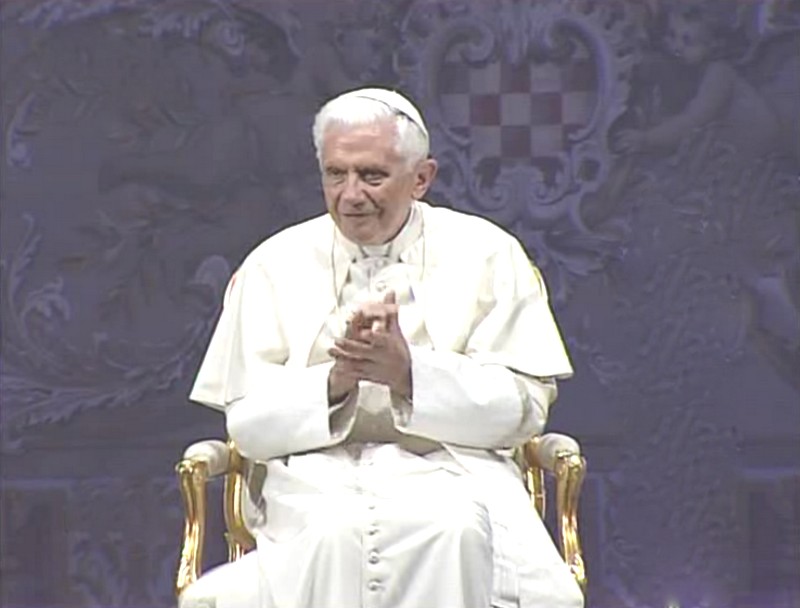
Note the Croatian Coat of Arms behind him, on the solemn curtain of the theatre, designed by Vlaho Bukovac in 1895.
| ZAGREB - 04.06.2011 - 18:15 National Croatian Theatre Meeting with representatives of civil society, the political, academic, cultural, and business world, with the diplomatic corps and with religious leaders Official translation Mr President, Dear Cardinals, Brother Bishops, Distinguished Ladies and Gentlemen, Brothers and Sisters, I am very glad that the first engagement of my visit should be with you, representing as you do key sectors of Croatian society and the Diplomatic Corps. My cordial greetings go to each of you personally and also to the important communities to which you belong: religious, political, academic and cultural, the world of the arts, finance and sport. I thank Archbishop Puljić and Professor Zurak for the kind words they have addressed to me, and I thank the musicians who have welcomed me in the universal language of music. This dimension of universality, characteristic of art and culture, is particularly appropriate for Christianity and the Catholic Church. Christ is fully human, and whatever is human finds in him and in his word the fulness of life and meaning. This splendid theatre is a symbolic place, expressive of your national and cultural identity. For me to come together with you in this place is a further cause of joy in spirit, because the Church is a mystery of communion and always rejoices in communion, in the richness of diversity. The participation of representatives from other Churches and Christian communities, as well as the Jewish and Muslim religions, helps remind us that religion is not a separate area marked off from society. Rather, it is a natural element within society, constantly recalling the vertical dimension: attentive listening to God as the condition for seeking the common good, for seeking justice and reconciliation in the truth. Religion places man in relation with God, the Creator and Father of all, and must therefore be a force for peace. Religions need always to be purified according to their true essence in order to correspond to their true mission. Here I would like to introduce the main topic of my brief reflection: the theme of conscience. This cuts across all the different fields in which you are engaged and it is fundamental for a free and just society, both at national and supranational levels. Naturally, I think of Europe, to which Croatia has always belonged on the historical and cultural plane, and which it is now about to enter on the political and institutional level. Truly, the great achievements of the modern age – the recognition and guarantee of freedom of conscience, of human rights, of the freedom of science and hence of a free society – should be confirmed and developed while keeping reason and freedom open to their transcendent foundation, so as to ensure that these achievements are not undone, as unfortunately happens in not a few cases. The quality of social and civil life and the quality of democracy depend in large measure on this “critical” point – conscience, on the way it is understood and the way it is informed. If, in keeping with the prevailing modern idea, conscience is reduced to the subjective field to which religion and morality have been banished, then the crisis of the West has no remedy and Europe is destined to collapse in on itself. If, on the other hand, conscience is rediscovered as the place in which to listen to truth and good, the place of responsibility before God and before fellow human beings – in other words, the bulwark against all forms of tyranny – then there is hope for the future. I am grateful to Professor Zurak for reminding us of the Christian roots of many of the cultural and academic institutions of this country, as indeed all over the European Continent. We need to be reminded of these origins, not least for the sake of historical truth, and it is important that we understand these roots properly, so that they can feed the present day too. It is crucial to grasp the inner dynamic of an event such as the birth of a university, of an artistic movement, or of a hospital. It is necessary to understand the why and the how of what took place, in order to recognize the value of this dynamic in the present day, as a spiritual reality that takes on a cultural and therefore a social dimension. At the heart of all these institutions are men and women, persons, consciences, moved by the power of truth and good. Some examples have been quoted, from among the famous sons and daughters of this land. I would like to single out Father Ruđer Josip Bošković, a Jesuit born in Dubrovnik three hundred years ago on 18 May 1711. He is a good illustration of the happy symbiosis of faith and scholarship, each stimulating the other through research that is at the same time open, diversified and capable of synthesis. His principal work, Theoria philosophiae naturalis, which was published in Vienna and later in Venice in the mid 18th century, bears a highly significant sub-title: redacta ad unicam legem virium in natura existentium, that is, “according to the one law of the forces existing in nature”. In Bošković, there is analysis, there is study of multiple branches of knowledge, but there is also a passion for unity. This is typical of Catholic culture. Hence, the foundation of a Catholic University in Croatia is a sign of hope. I trust that it will help to foster unity among the various fields of contemporary culture, the values and the identity of your people, lending continuity to the fruitful contribution of the Church to the history of the noble Croatian Nation. To return to Father Bošković, the experts say that his theory of “continuity”, which holds true both in the natural sciences and in geometry, accords well with some of the great discoveries of modern physics. What are we to say? Let us pay tribute to the illustrious Croat, but also to the true Jesuit; let us pay tribute to the cultivator of truth who knows how far the truth surpasses him, but who also knows, in the light of truth, how to engage fully the resources of reason with which he has been endowed by God himself. As well as paying tribute, however, we must learn to appreciate the method, the mental openness of these great men. This brings us back to conscience as the keystone on which to base a culture and build up the common good. It is by forming consciences that the Church makes her most specific and valuable contribution to society. It is a contribution that begins in the family and is strongly reinforced in the parish, where infants, children and young people learn to deepen their knowledge of the sacred Scriptures, the “great codex” of European culture; at the same time they learn what it means for a community to be built upon gift, not upon economic interests or ideology, but upon love, “the principal driving force behind the authentic development of every person and of all humanity” (Caritas in Veritate, 1). This logic of gratuitousness, learnt in infancy and adolescence, is then lived out in every area of life, in games, in sport, in interpersonal relations, in art, in voluntary service to the poor and the suffering, and once it has been assimilated it can be applied to the most complex areas of political and economic life so as to build up a polis that is welcoming and hospitable, but at the same time not empty, not falsely neutral, but rich in humanity, with a strongly ethical dimension. It is here that the lay faithful are called to give generously of the formation they have received, guided by the principles of the Church’s Social Doctrine, for the sake of authentic secularism, social justice, the defence of life and of the family, freedom of religion and education. Distinguished friends, your presence here and Croatia’s cultural tradition have prompted these brief reflections. I offer them to you as a mark of my esteem and above all of the Church’s desire to walk in the midst of this people in the light of the Gospel. I thank you for your attention, and from my heart I bless all of you, all those you love and all that you do. |
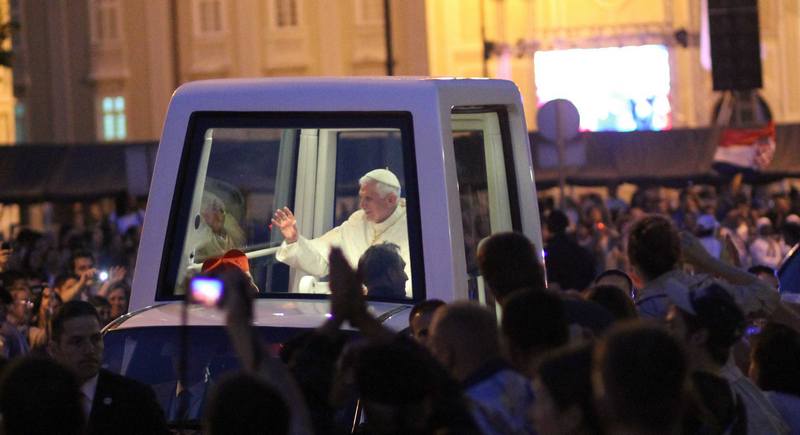
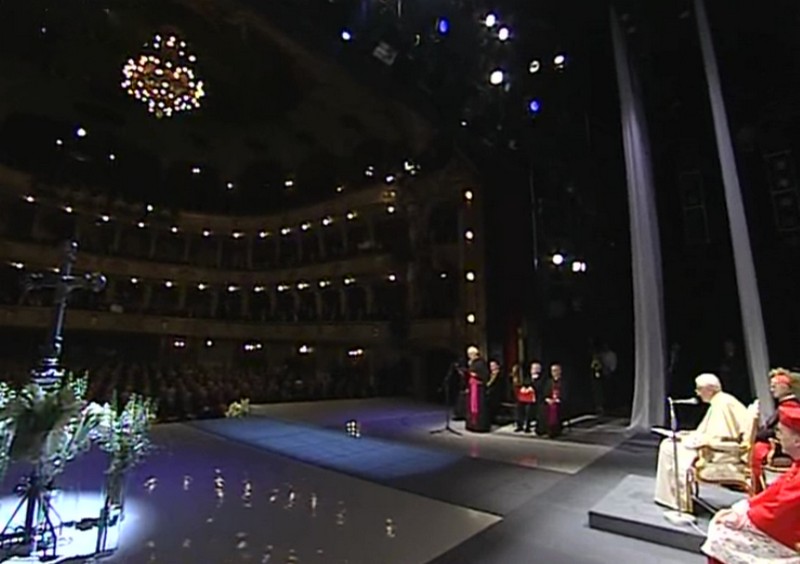
Pope Bendict XVI in Croatian National Theatre in Zagreb
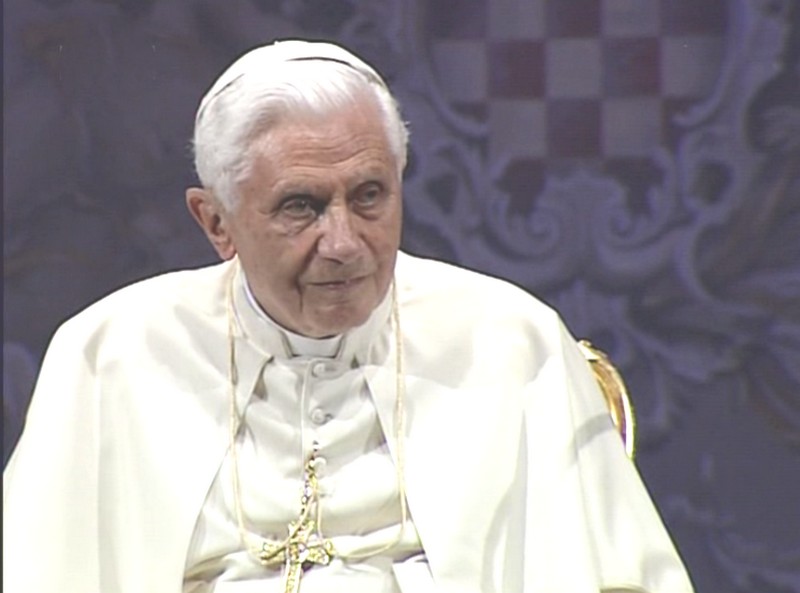
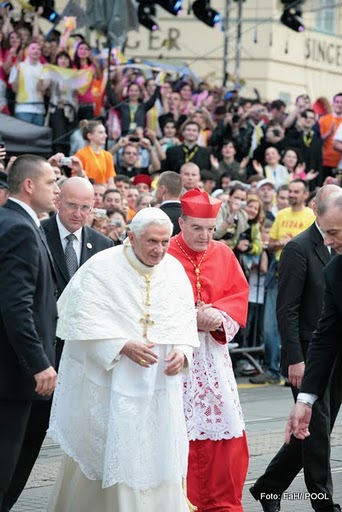
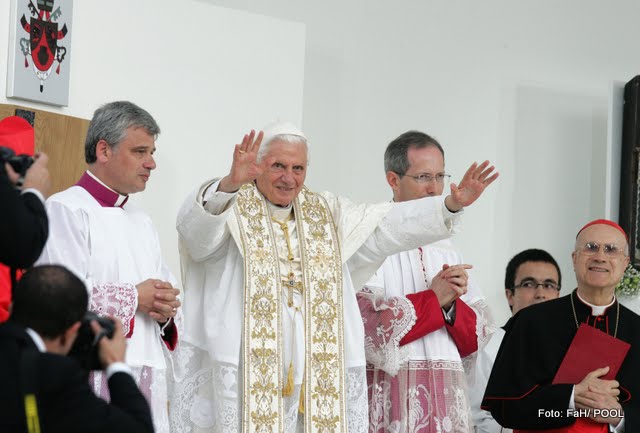
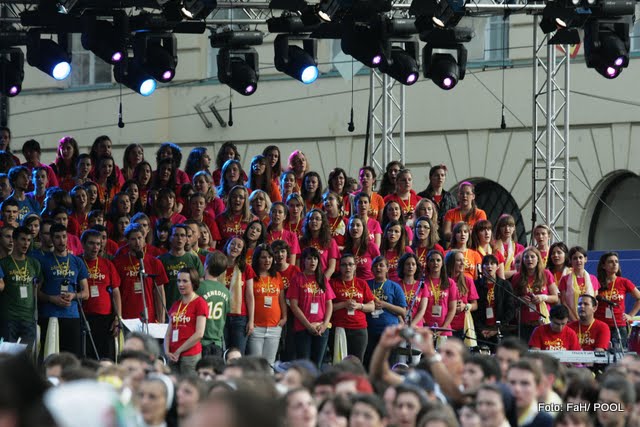
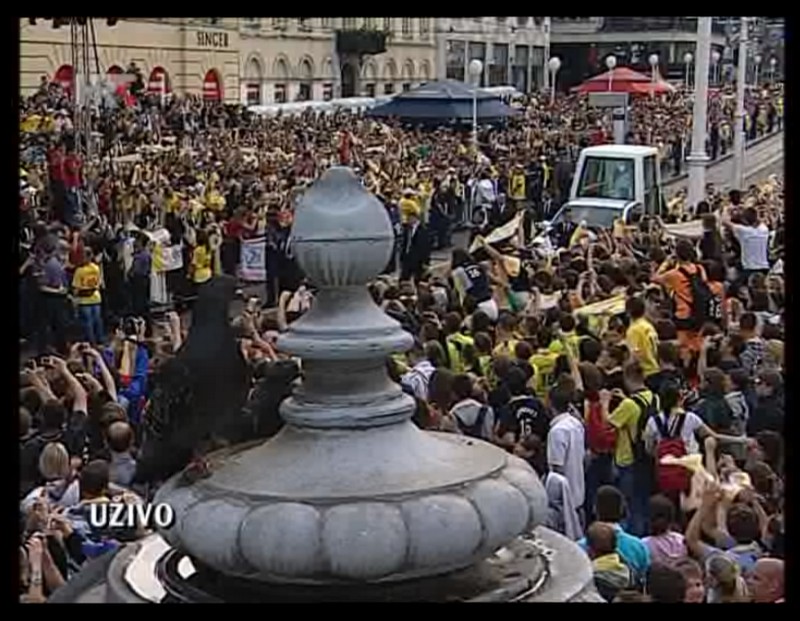
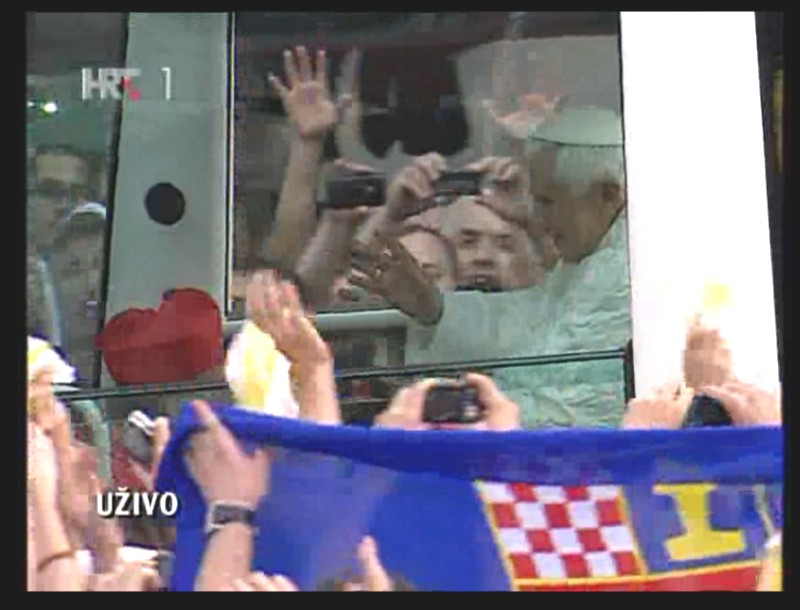
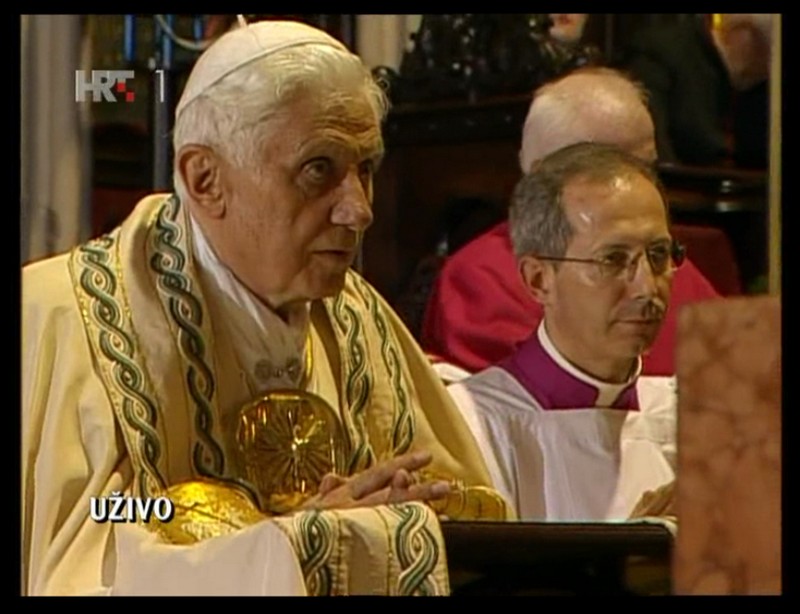
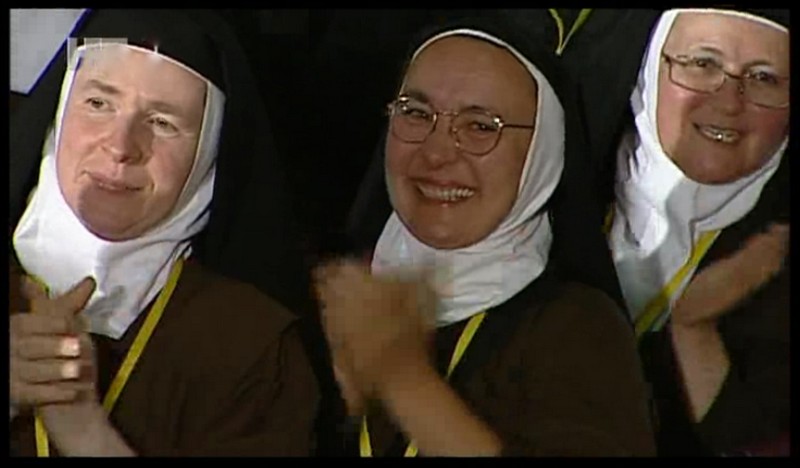
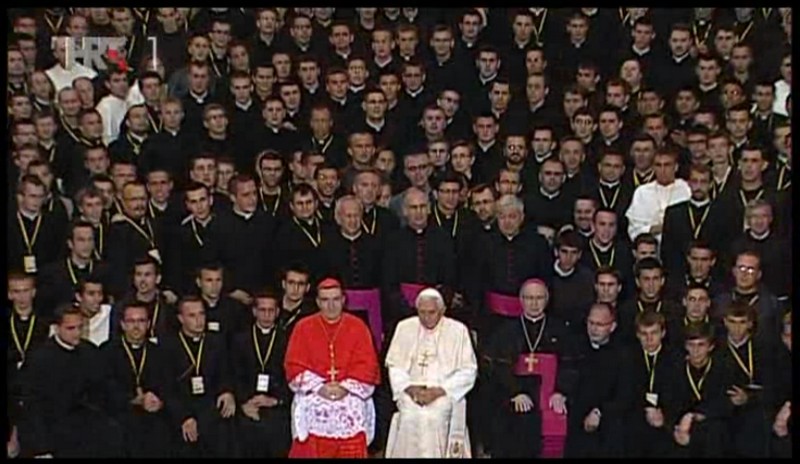
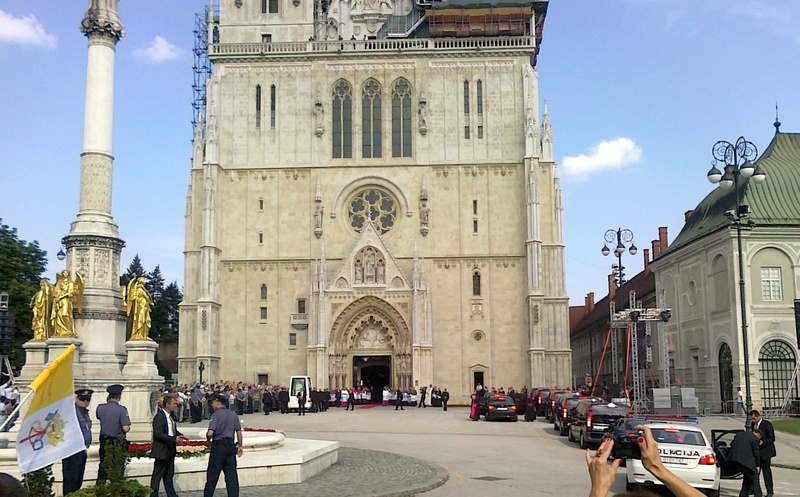
The Pope arriving at the Zagreb Cathedral. Photo by Snježana Božić.
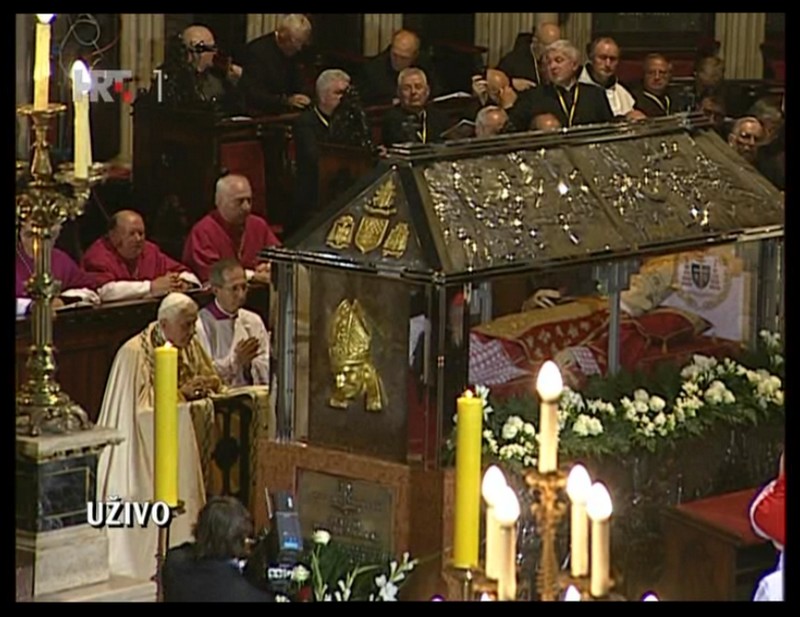
Pope Benedict XVI praying in front of the grave of Blessed Alojzije Stepinac in the Zagreb Cathedral
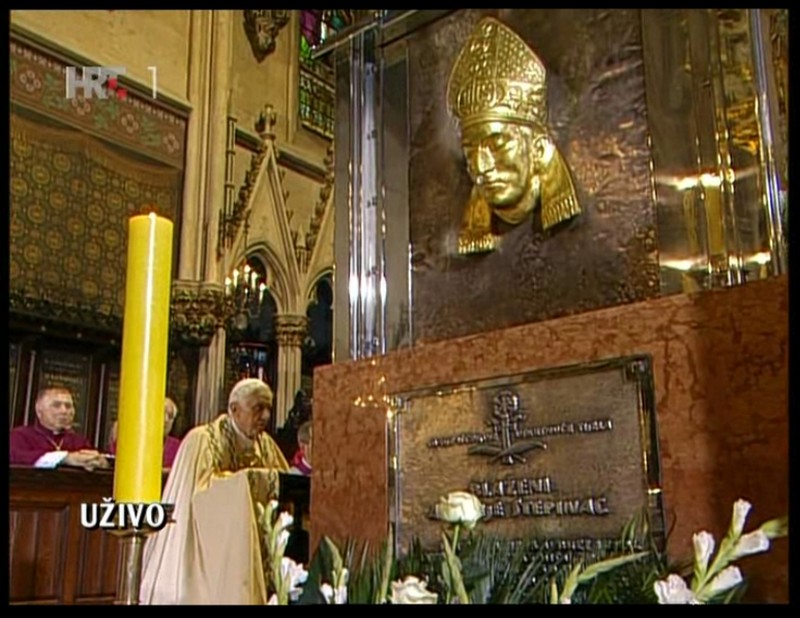
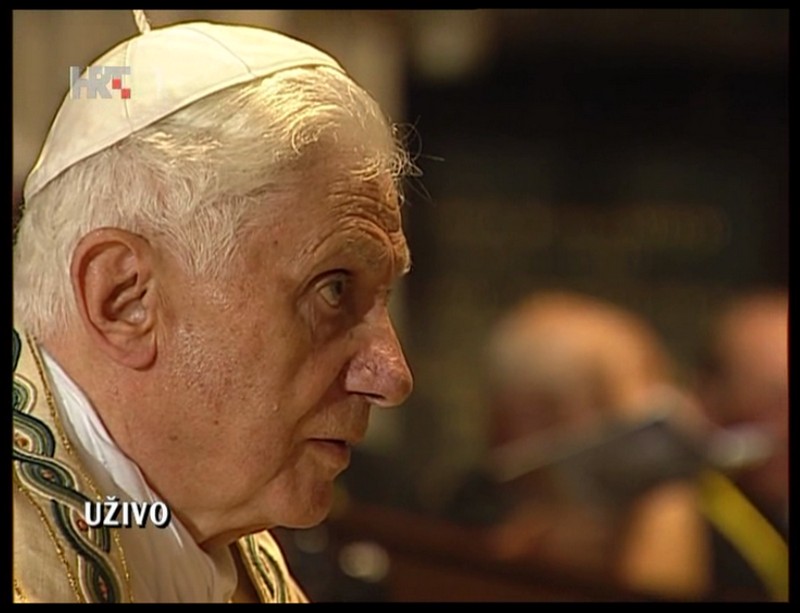
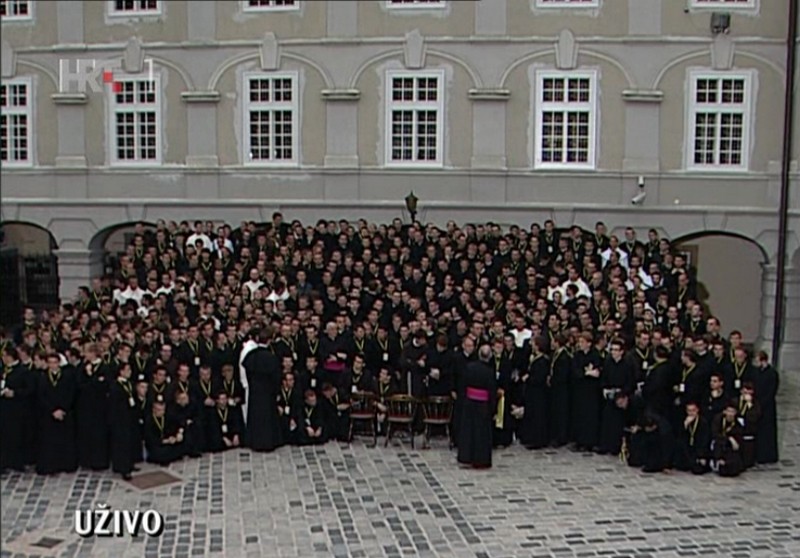
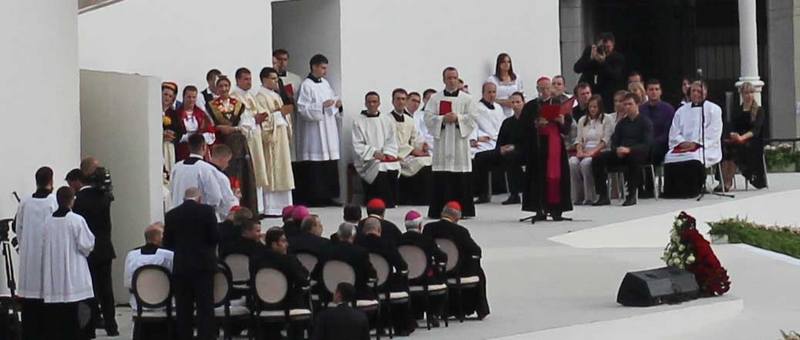
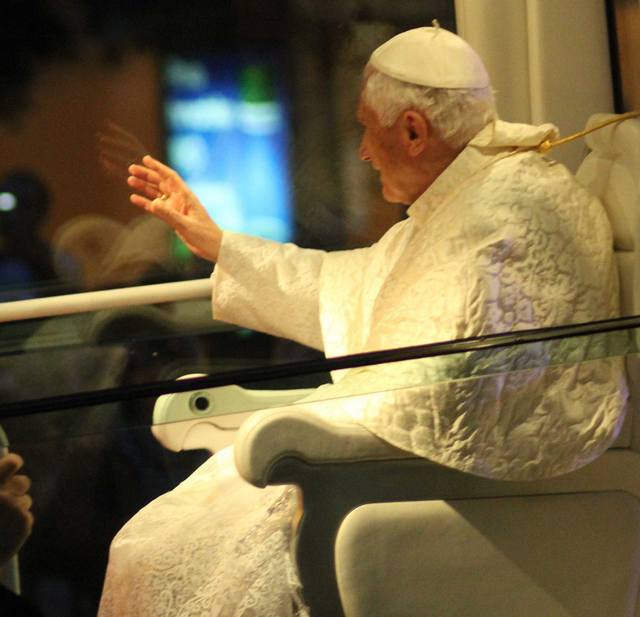
Pope Benedict XVI in Popemobile in Zagreb, Croatia June 4th 2011. Photo by Ivo Bach
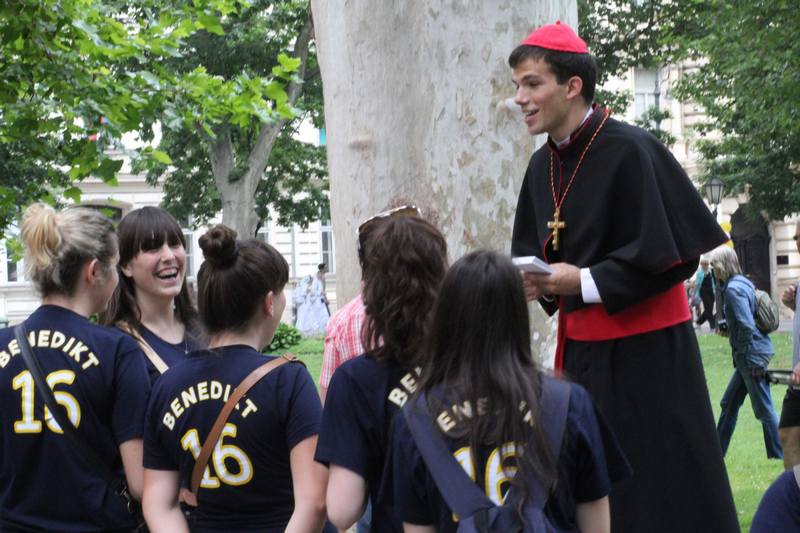
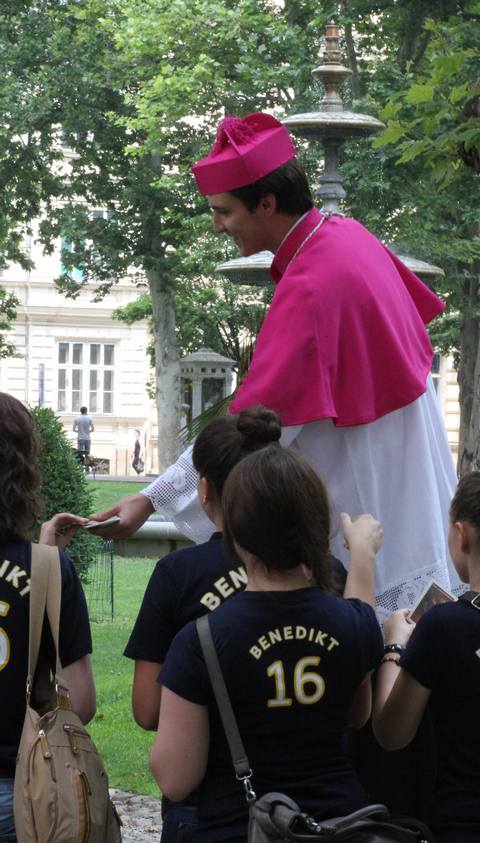
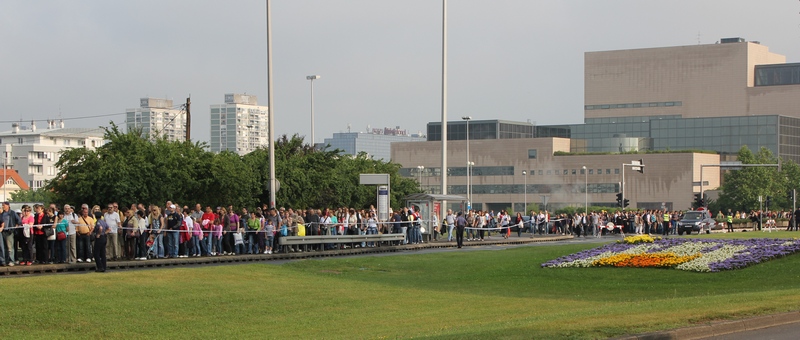
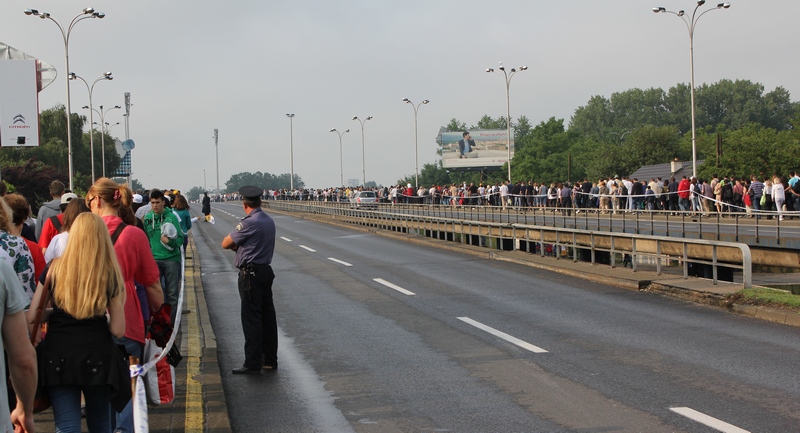
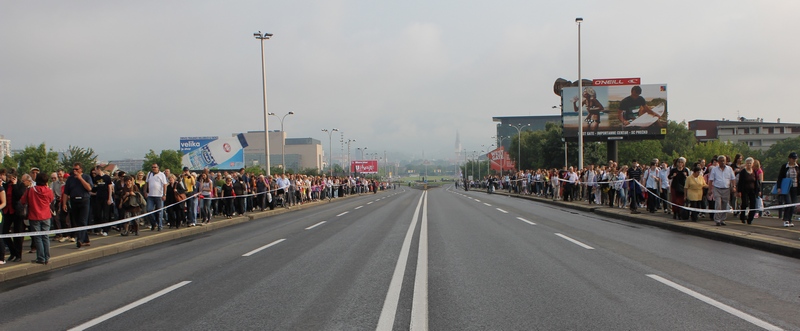
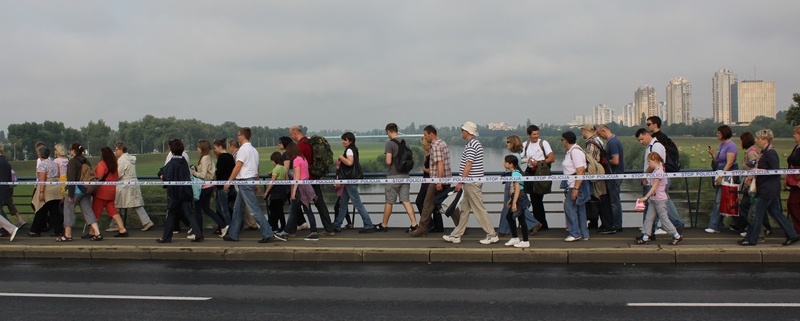
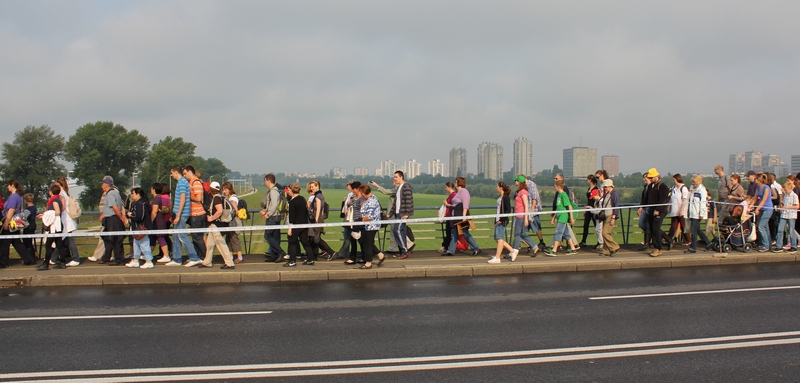
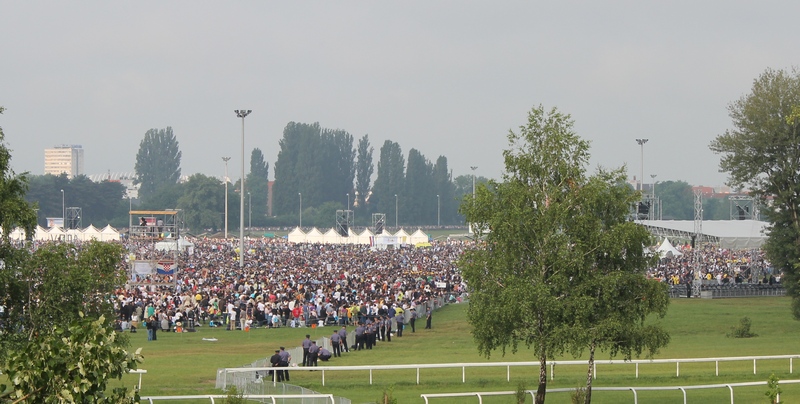
A rich cultural program started already at 3 o'clock in the morning.
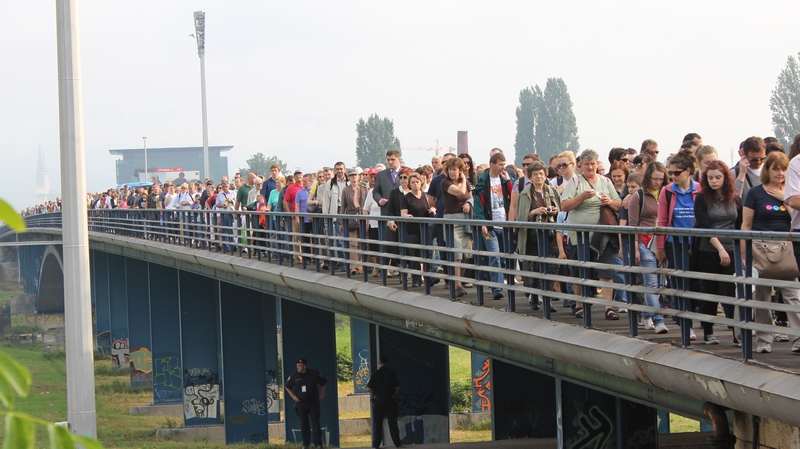
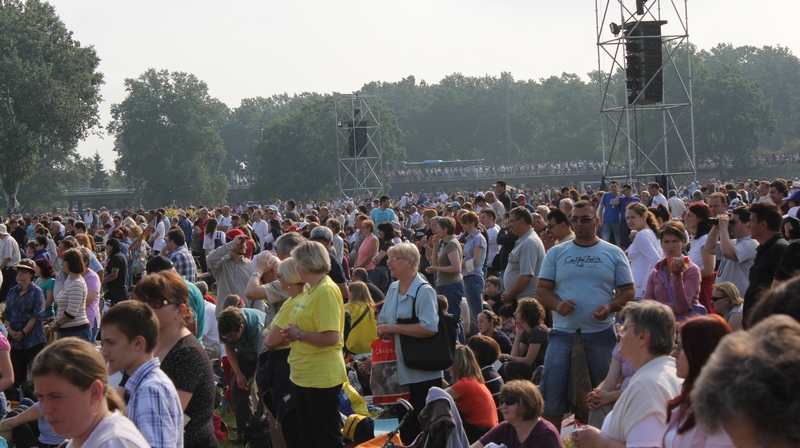
Behind is a part of the Zagreb Bridge, full of pilgrims arriving to the Holy Mass.
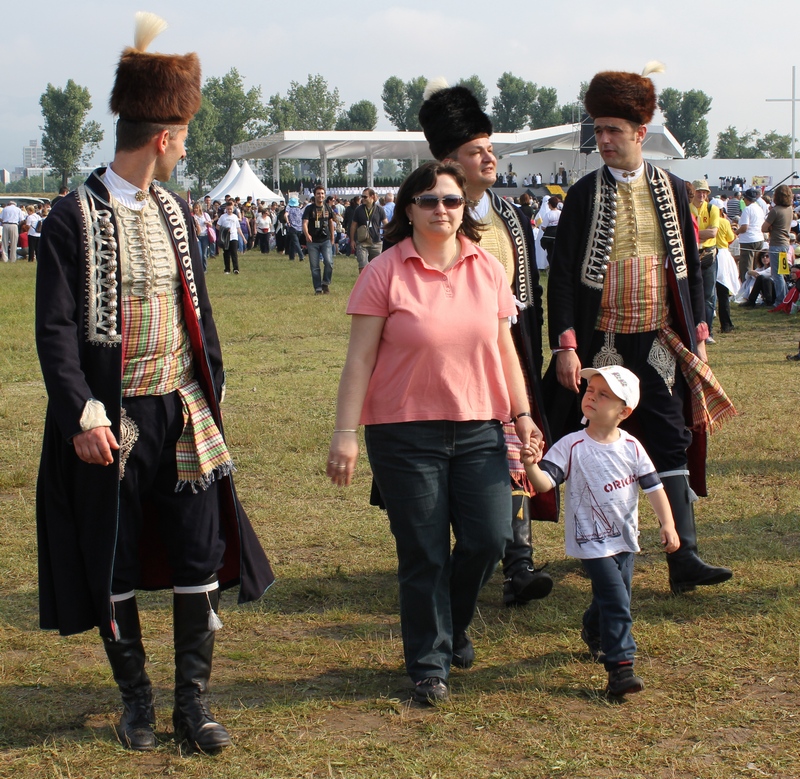
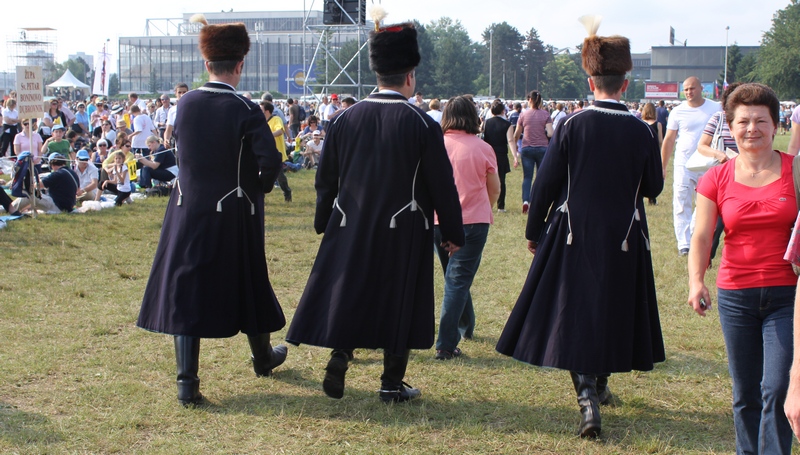
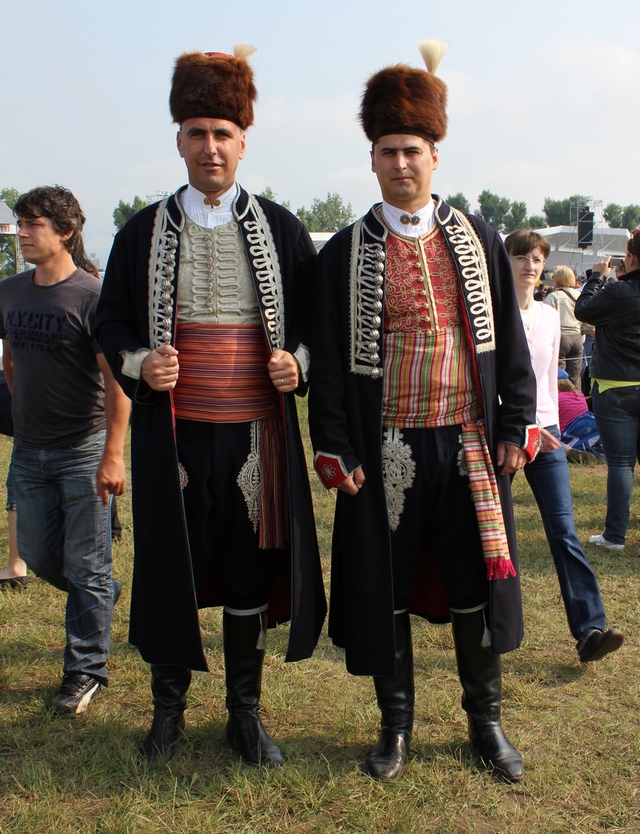
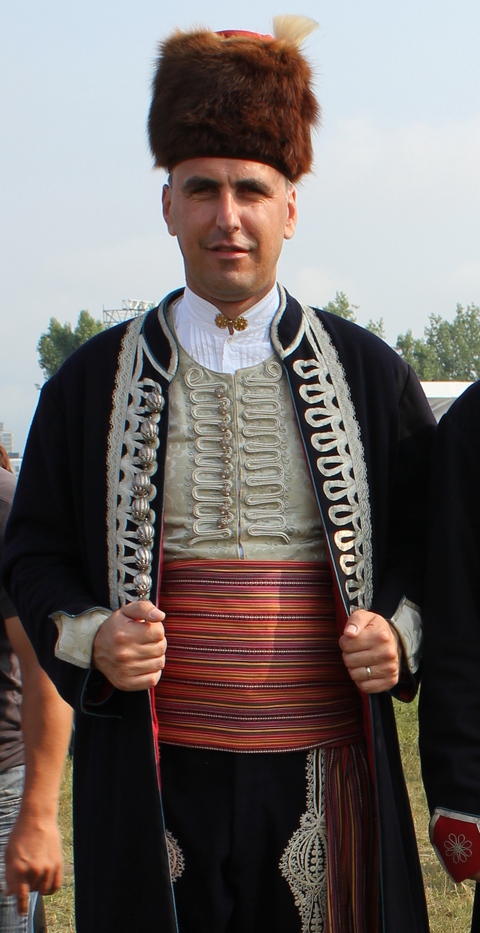
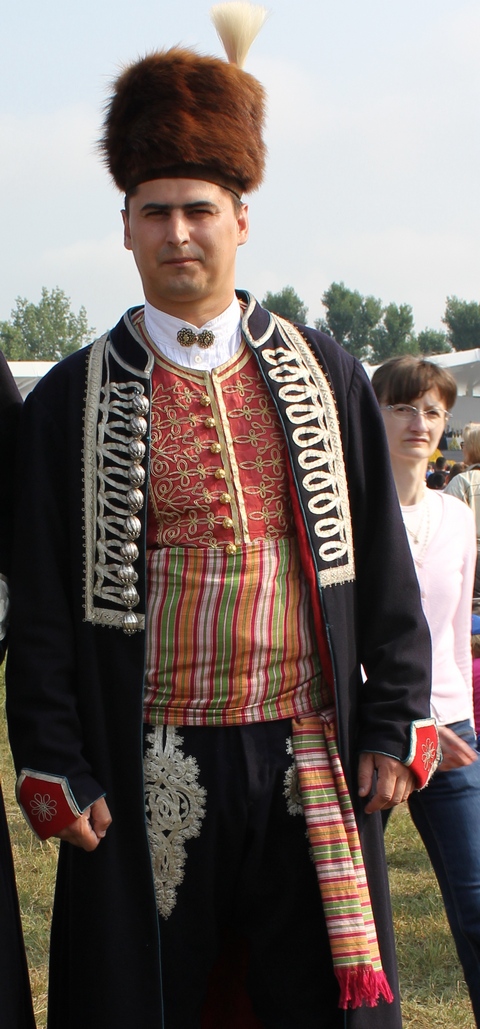
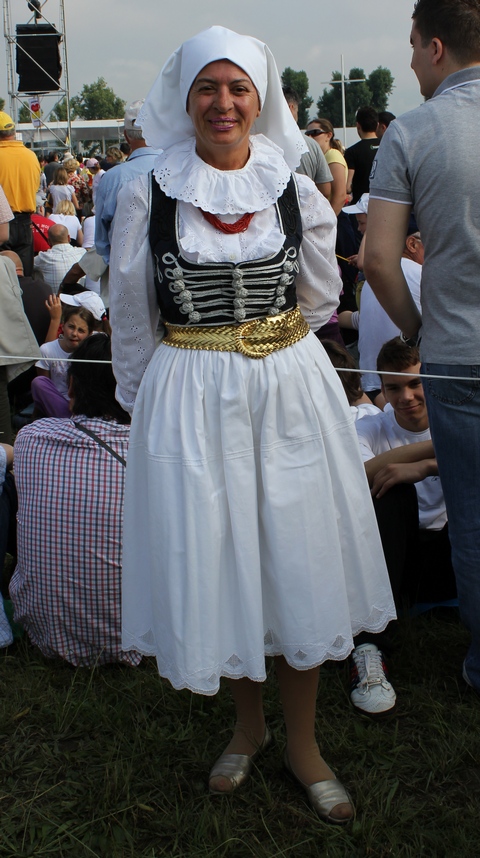
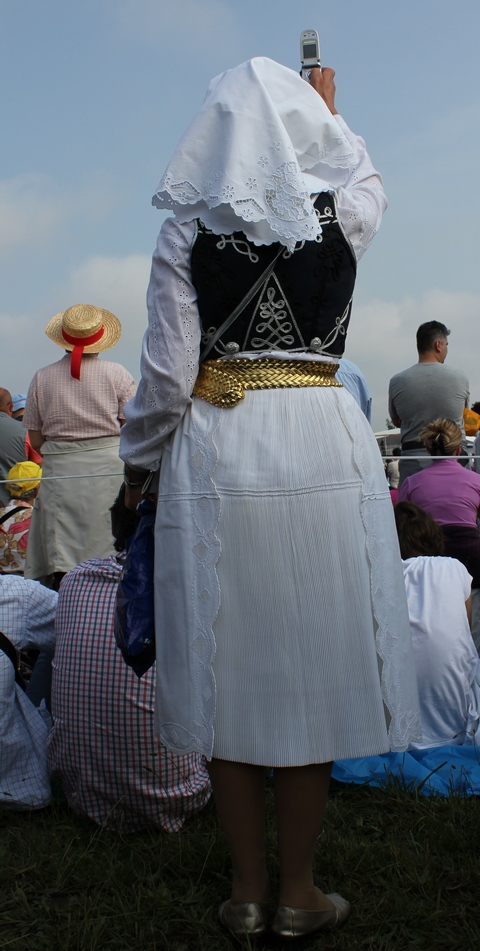
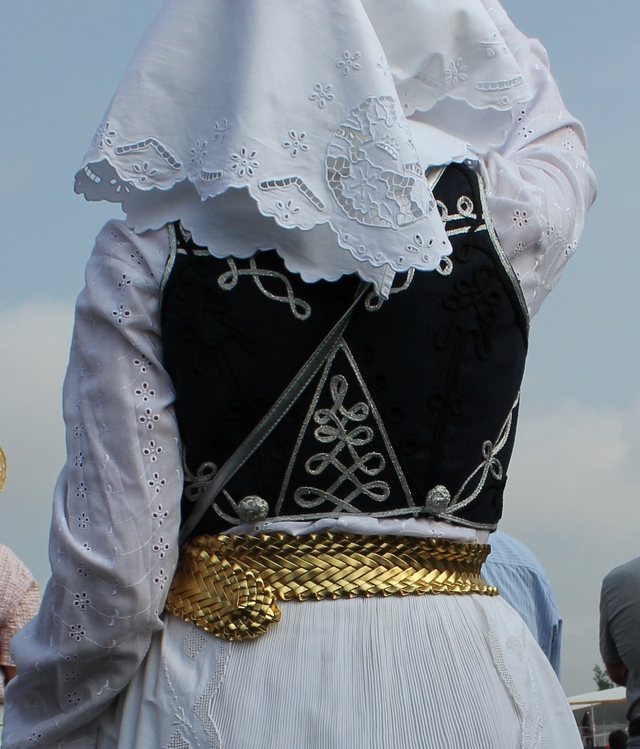
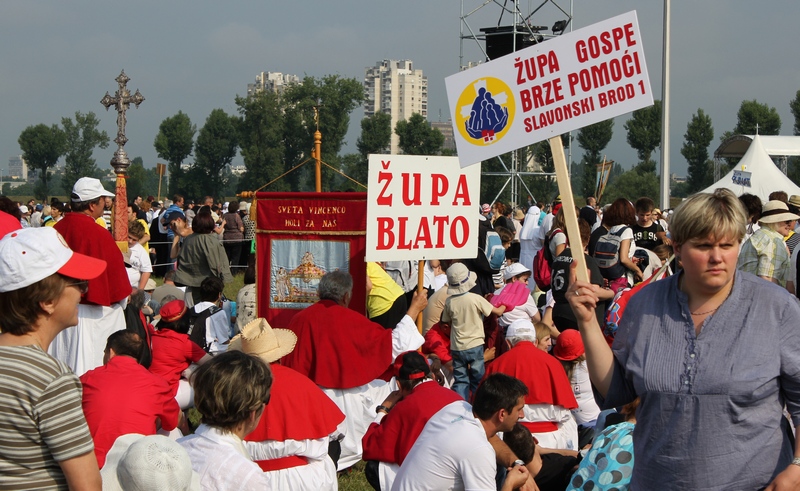
On the left the flag of the Blato Parish: Svita Vizenca, moli za nas! (St. Vicenca, pray for us!)
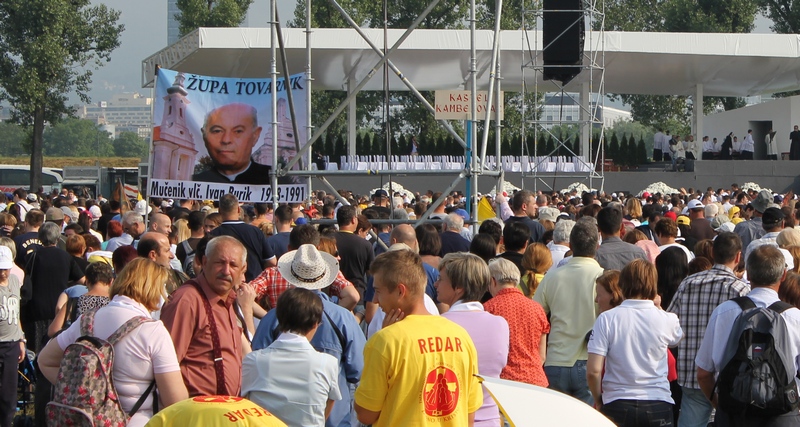
Exhumed from a mass grave in 1998.
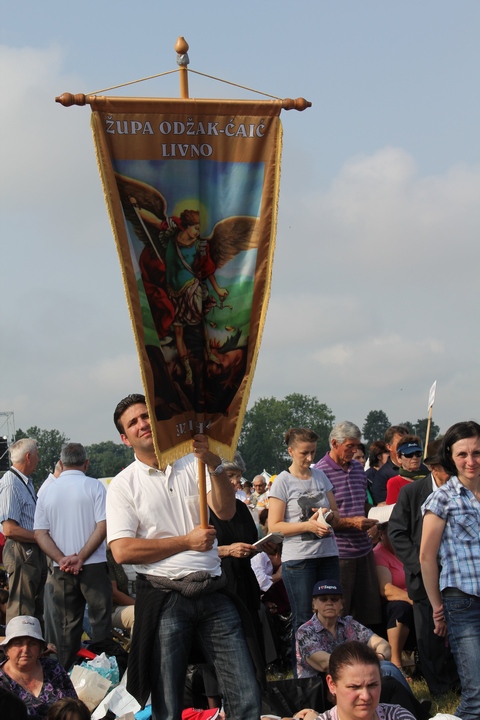
Pilgrims from the parish of Odžak - Čaić - Livno in Bosnia and Herzegovina.
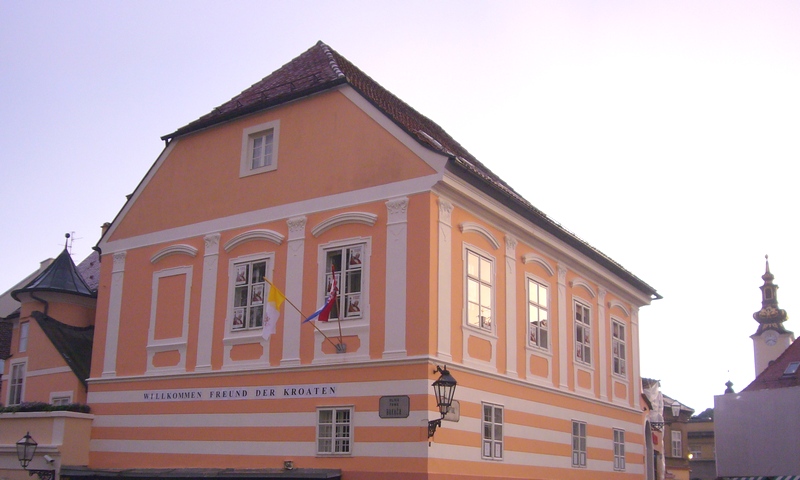
A house in front of the Zagreb Cathedral, bearing the inscription:
WILLKOMEN FREUND DER KROATEN - Welcome Friend of the Croats (photo by Snježana Božić)
Please, go to the next page below.
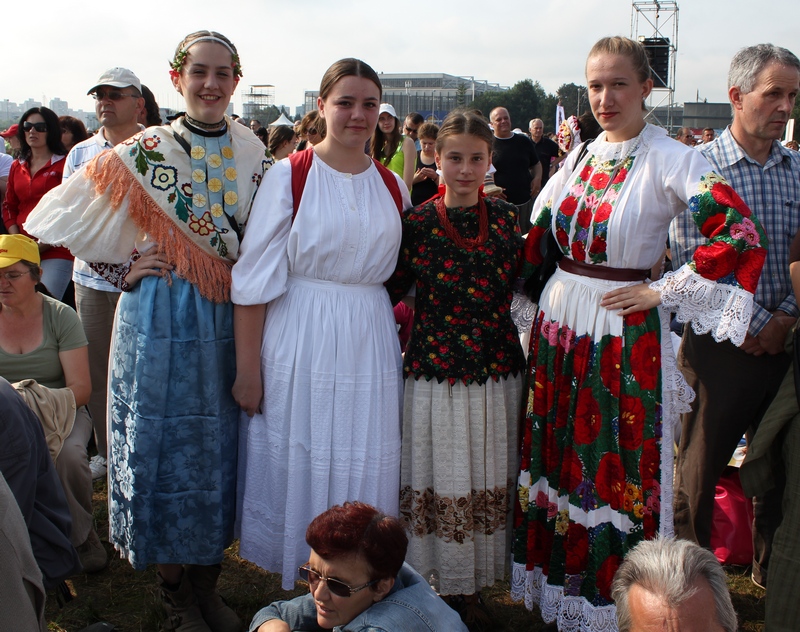
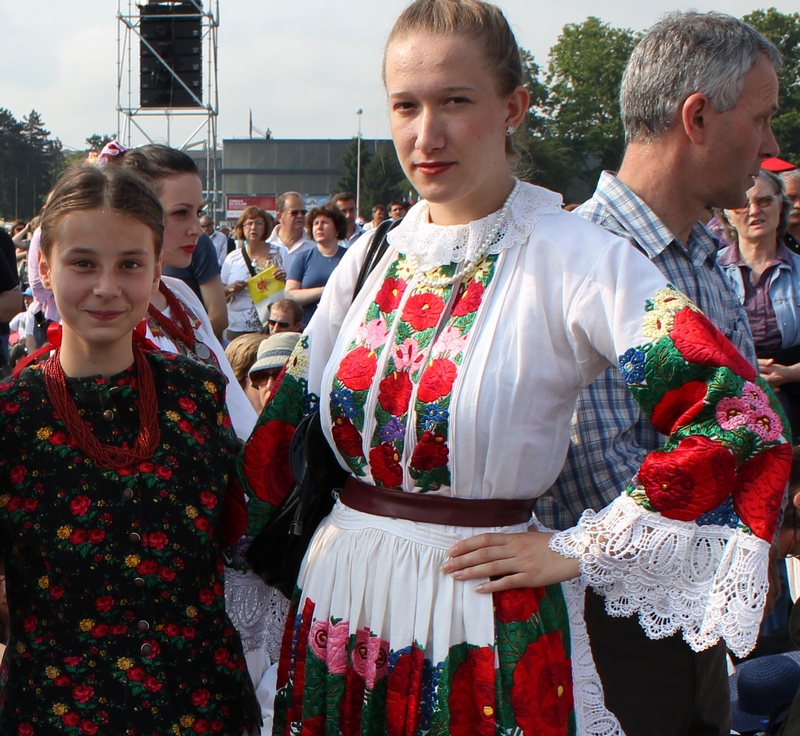
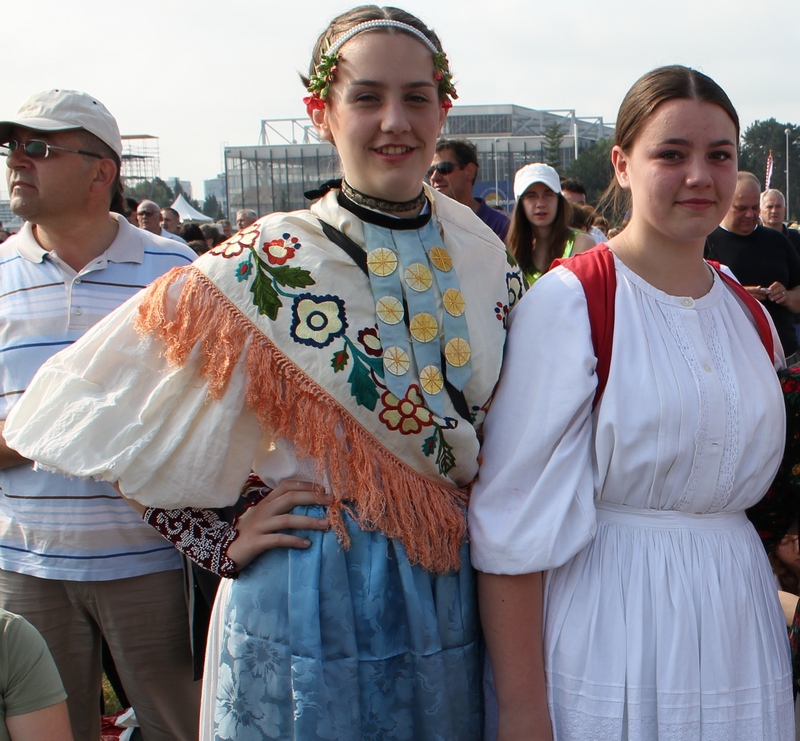
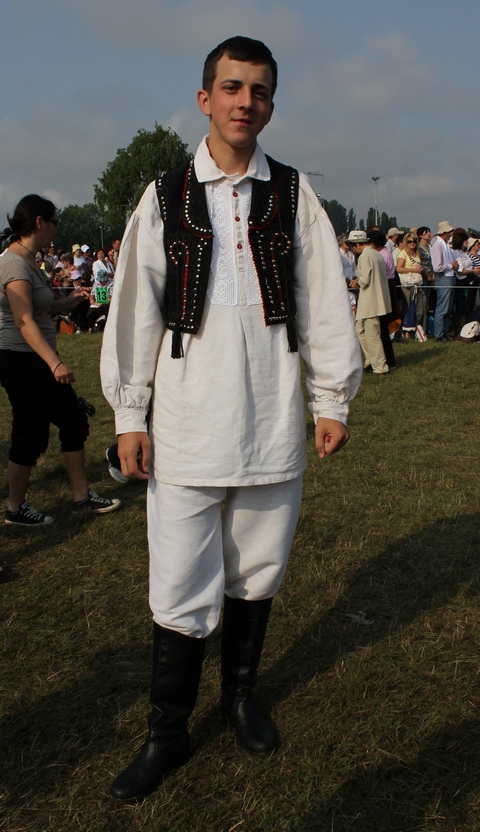
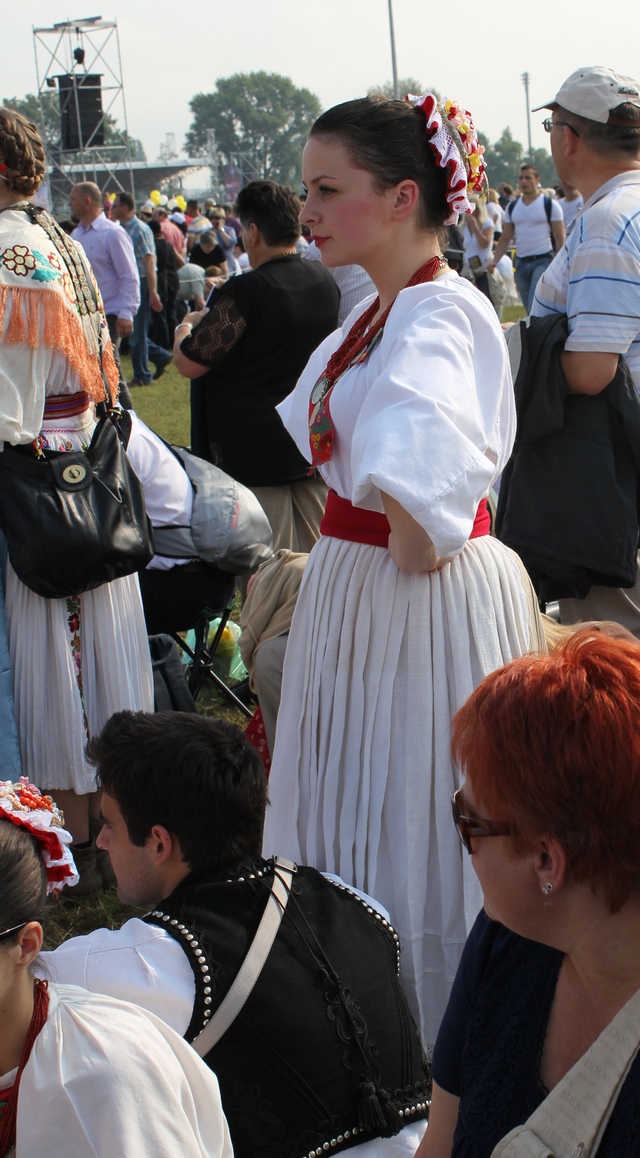
Another Turopolje beauty...
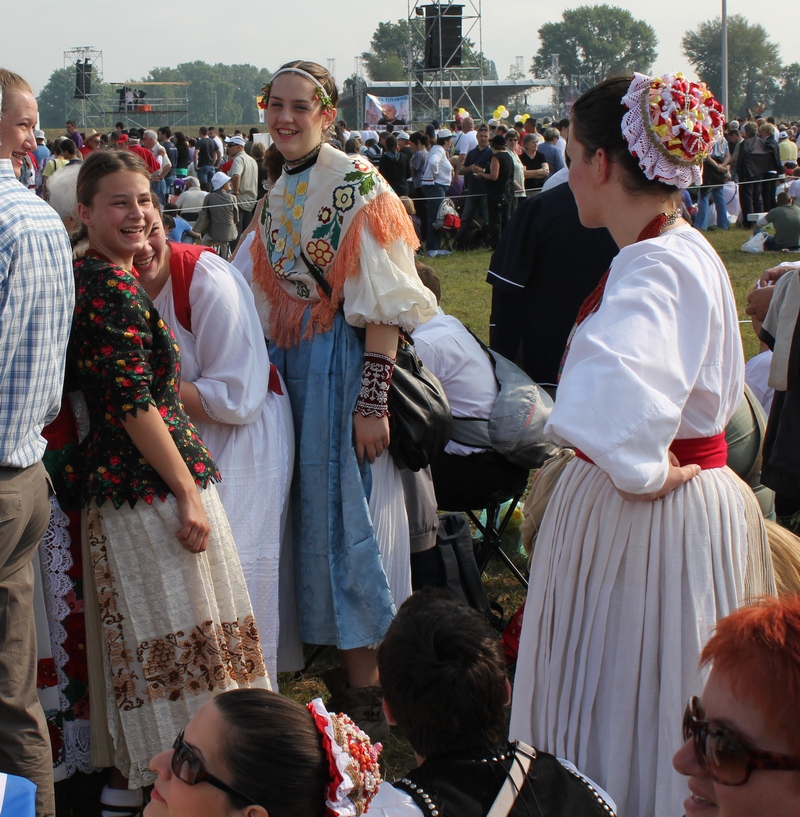
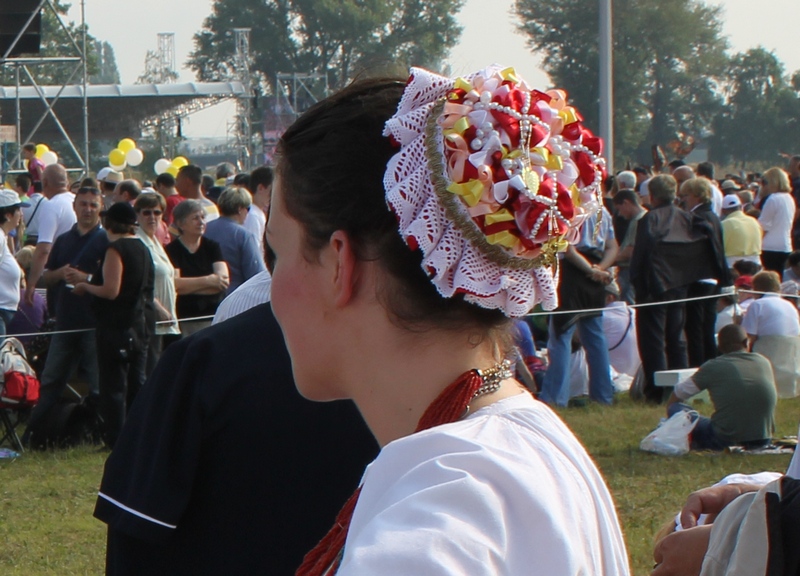
Poculica on her head is a real masterpiece.
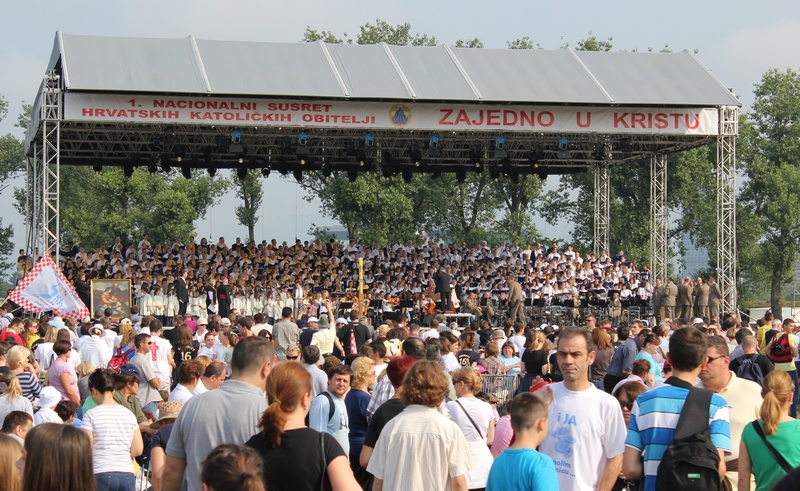
The United Mixed Choir composed of 500 singers, accompanied with the Orchestra of Croatian Army,
warmed up the pilgrims for hours before the arrival of the Pope.
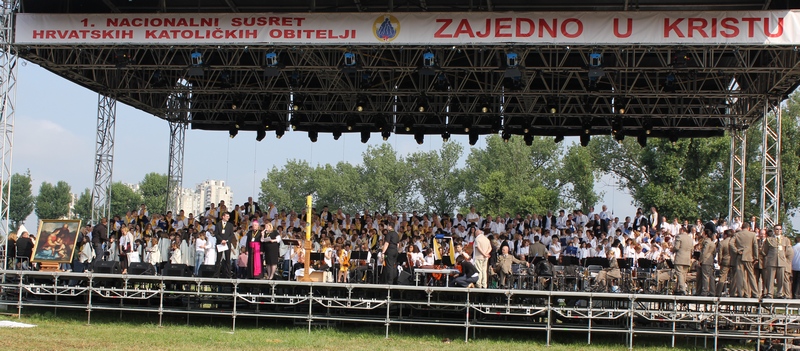
The First National Meeting of Croatian Catholic Families
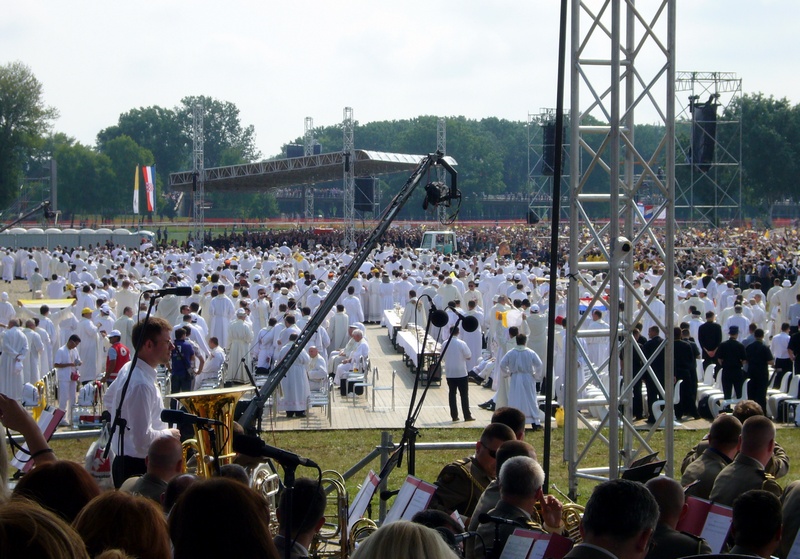
A view in the oposite direction, from the United Choir to the public. Photo by Snježana Božić.
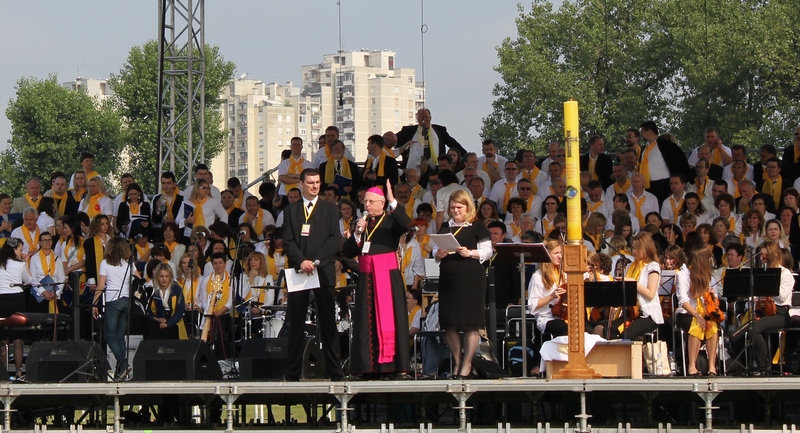
Valter Župan, bishop of Krk (a town on the island of Krk), addressing to the audience.
On the right Tanja Baran, a well known Croatian newspaperwoman.
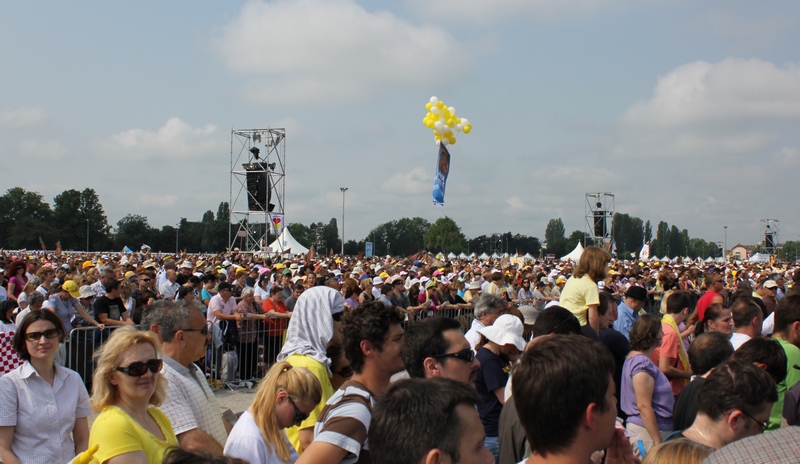
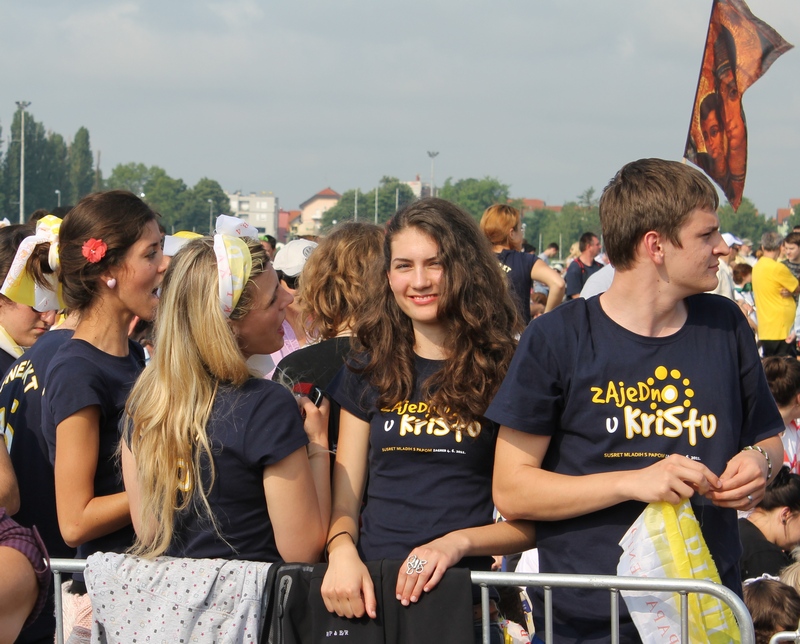
Singing with the choir...
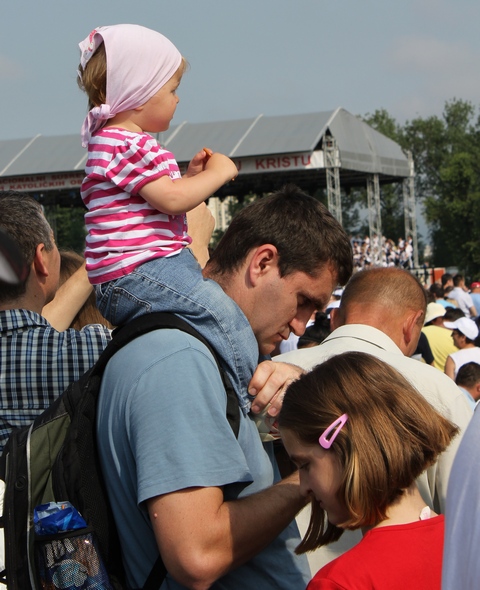
The Holy Mass will be dedicated to Croatian familes.
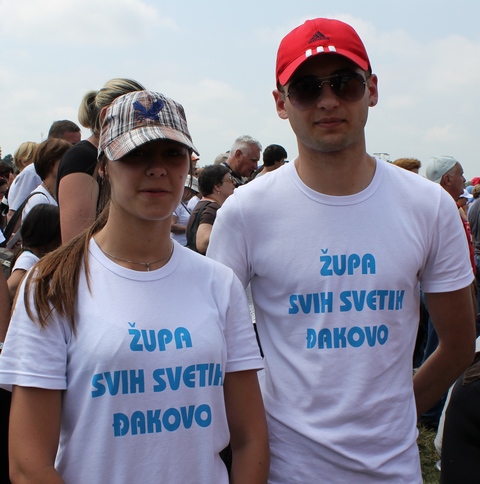
Young pilgrims from the city of Đakovo.
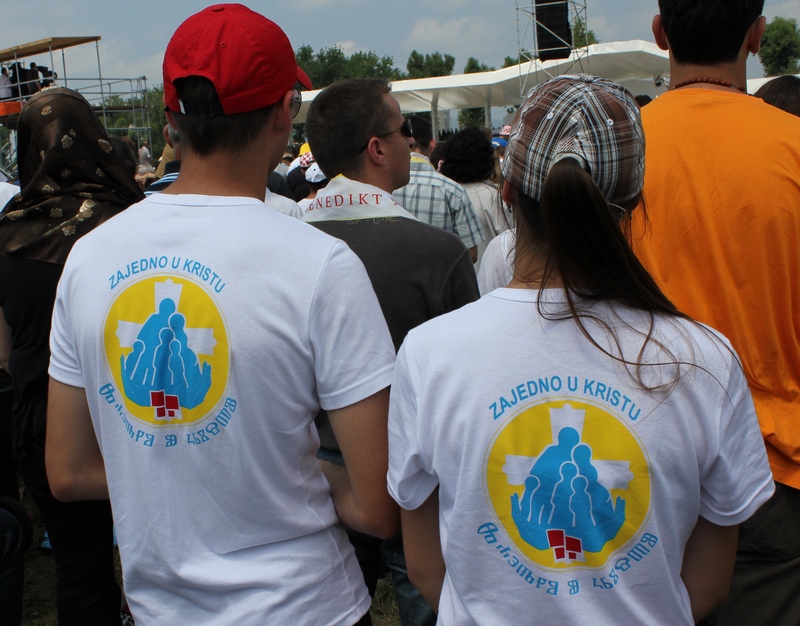
Zajedno u Kristu - Together with Christ, not only in Latin Script, but also in Croatian Glagolitic Script.
Please, go to the next page below.
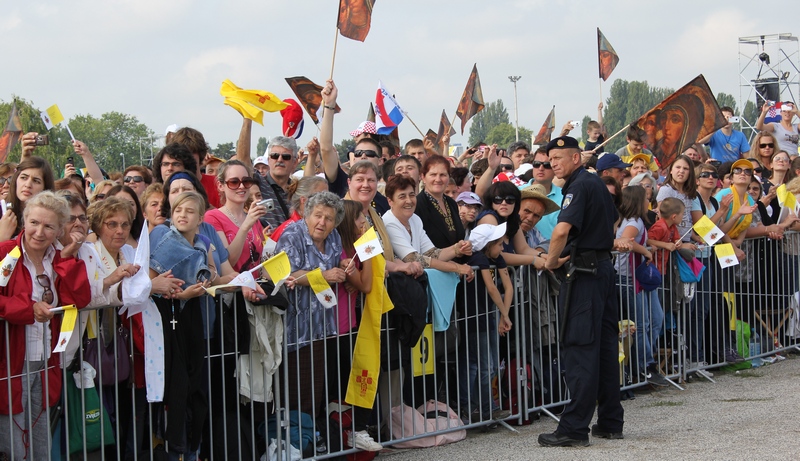
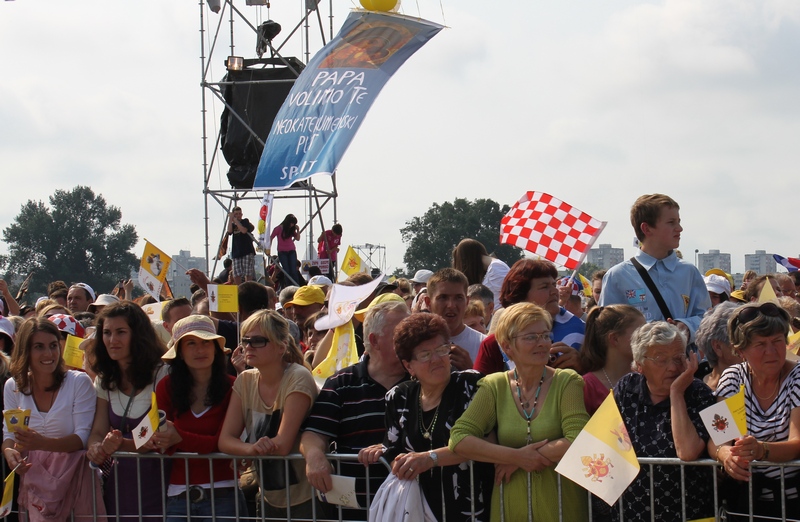
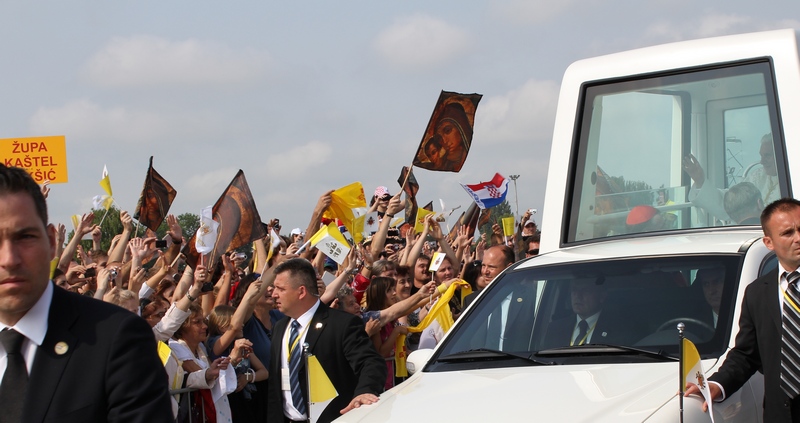
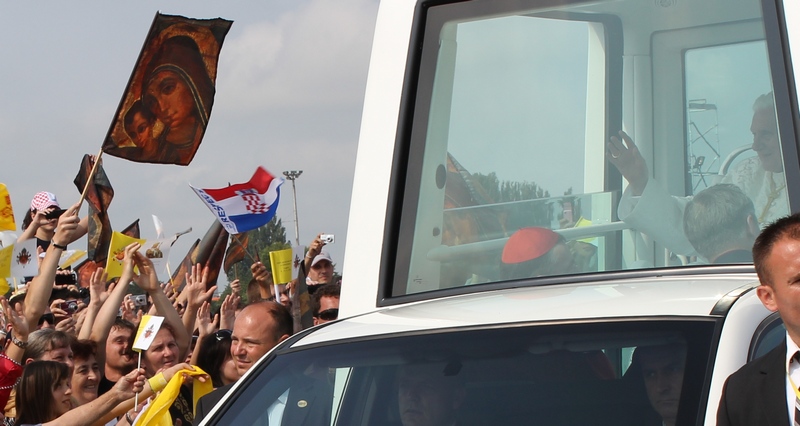
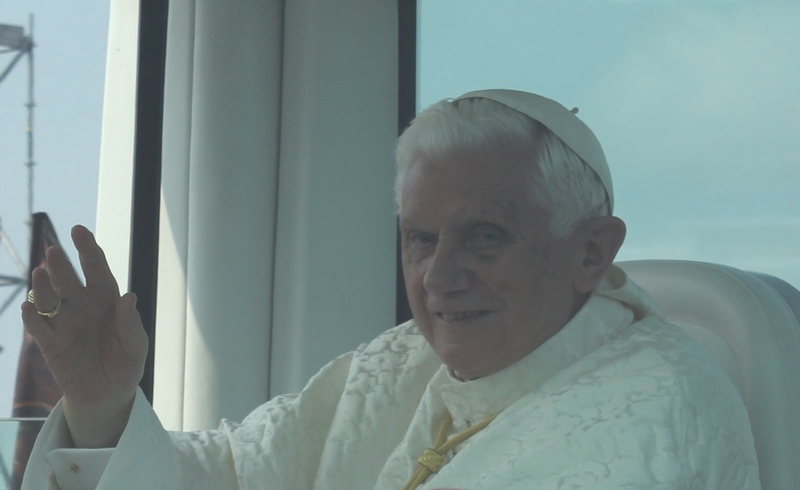
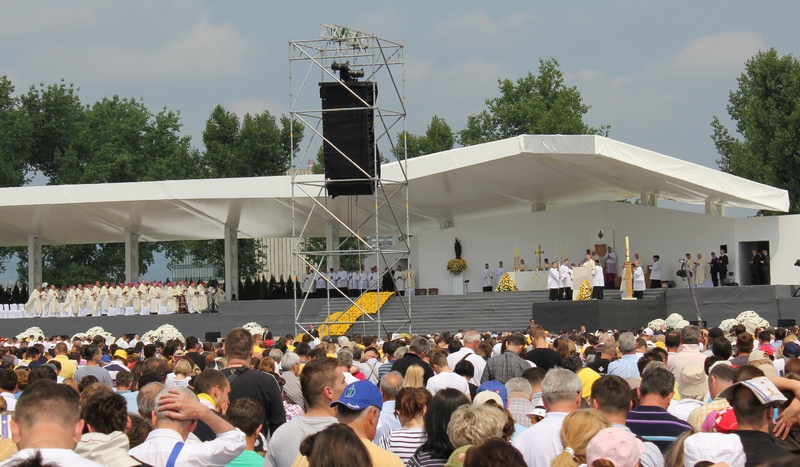
The Pope on the right, and Croatian bishops and archbishops on the left.
| ZAGREB - 05.06.2011 - 10:00 Hippodrome Holy Mass Official translation Dear Brothers and Sisters! In this Mass at which it is my joy to preside, concelebrating with numerous brothers in the Episcopate and with a great number of priests, I give thanks to the Lord for all the beloved families gathered here, and for all the others who are linked with us through radio and television. I offer particular thanks to Cardinal Josip Bozanić, Archbishop of Zagreb, for his kind words at the beginning of this Mass. I address my greetings to all and express my great affection with an embrace of peace! We have recently celebrated the Ascension of the Lord and we prepare ourselves to receive the great gift of the Holy Spirit. In the first reading, we saw how the apostolic community was united in prayer in the Upper Room with Mary, the mother of Jesus (cf. Acts 1:12-14). This is a picture of the Church with deep roots in the paschal event: indeed, the Upper Room is the place where Jesus instituted the Eucharist and the priesthood during the Last Supper, and where, having risen from the dead, he poured out the Holy Spirit upon the Apostles on the evening of Easter Sunday (cf. Jn 20:19-23). The Lord directed his disciples “not to depart from Jerusalem, but to wait for the promise of the Father” (Acts 1:4); he asked that they might remain together to prepare themselves to receive the gift of the Holy Spirit. And they gathered together in prayer with Mary in the Upper Room, waiting for the promised event (cf. Acts 1:14). Remaining together was the condition given by Jesus for them to experience the coming of the Paraclete, and prolonged prayer served to maintain them in harmony with one another. We find here a formidable lesson for every Christian community. Sometimes it is thought that missionary efficacy depends primarily upon careful planning and its intelligent implementation by means of specific action. Certainly, the Lord asks for our cooperation, but his initiative has to come first, before any response from us: his Spirit is the true protagonist of the Church, to be invoked and welcomed. In the Gospel, we heard the first part of the so-called “high-priestly prayer” of Jesus (cf. Jn 17:1-11a) – at the conclusion of his farewell discourses – full of trust, sweetness and love. It is called “the high-priestly prayer” because in it Jesus is presented as a priest interceding for his people as he prepares to leave this world. The passage is dominated by the double theme of the hour and the glory. It deals with the hour of death (cf. Jn 2:4; 7:30; 8:20), the hour in which the Christ must pass from this world to the Father (13:1). But at the same time it is also the hour of his glorification which is accomplished by means of the Cross, called by John the Evangelist “exaltation”, namely the raising up, the elevation to glory: the hour of the death of Jesus, the hour of supreme love, is the hour of his highest glory. For the Church too, for every Christian, the highest glory is the Cross, which means living in charity, in total gift to God and to others. Dear brothers and sisters! I very willingly accepted the invitation given to me by the Bishops of Croatia to visit this country on the occasion of the first National Gathering of Croatian Catholic Families. I express my sincere appreciation for this attention and commitment to the family, not only because today this basic human reality, in your nation as elsewhere, has to face difficulties and threats, and thus has special need of evangelization and support, but also because Christian families are a decisive resource for education in the faith, for the up-building of the Church as a communion and for her missionary presence in the most diverse situations in life. I know the generosity and the dedication with which you, dear Pastors, serve the Lord and the Church. Your daily labour for the faith formation of future generations, as well as for marriage preparation and for the accompaniment of families, is the fundamental path for regenerating the Church anew and for giving life to the social fabric of the nation. May you remain dedicated to this important pastoral commitment! Everyone knows that the Christian family is a special sign of the presence and love of Christ and that it is called to give a specific and irreplaceable contribution to evangelization. Blessed John Paul II, who visited this noble country three times, said that “the Christian family is called upon to take part actively and responsibly in the mission of the Church in a way that is original and specific, by placing itself, in what it is and what it does as an ‘intimate community of life and love’, at the service of the Church and of society” (Familiaris consortio, 50). The Christian family has always been the first way of transmitting the faith and still today retains great possibilities for evangelization in many areas. Dear parents, commit yourselves always to teach your children to pray, and pray with them; draw them close to the Sacraments, especially to the Eucharist, as we celebrate the 600th anniversary of the Eucharistic miracle of Ludbreg; and introduce them to the life of the Church; in the intimacy of the home do not be afraid to read the sacred Scriptures, illuminating family life with the light of faith and praising God as Father. Be like a little Upper Room, like that of Mary and the disciples, in which to live unity, communion and prayer! By the grace of God, many Christian families today are acquiring an ever deeper awareness of their missionary vocation, and are devoting themselves seriously to bearing witness to Christ the Lord. Blessed John Paul II once said: “An authentic family, founded on marriage, is in itself ‘good news’ for the world.” And he added: “In our time the families that collaborate actively in evangelization are ever more numerous [...] the hour of the family has arrived in the Church, which is also the hour of the missionary family” (Angelus, 21 October 2001). In today’s society the presence of exemplary Christian families is more necessary and urgent than ever. Unfortunately, we are forced to acknowledge the spread of a secularization which leads to the exclusion of God from life and the increasing disintegration of the family, especially in Europe. Freedom without commitment to the truth is made into an absolute, and individual well-being through the consumption of material goods and transient experiences is cultivated as an ideal, obscuring the quality of interpersonal relations and deeper human values; love is reduced to sentimental emotion and to the gratification of instinctive impulses, without a commitment to build lasting bonds of reciprocal belonging and without openness to life. We are called to oppose such a mentality! Alongside what the Church says, the testimony and commitment of the Christian family – your concrete testimony – is very important, especially when you affirm the inviolability of human life from conception until natural death, the singular and irreplaceable value of the family founded upon matrimony and the need for legislation which supports families in the task of giving birth to children and educating them. Dear families, be courageous! Do not give in to that secularized mentality which proposes living together as a preparation, or even a substitute for marriage! Show by the witness of your lives that it is possible, like Christ, to love without reserve, and do not be afraid to make a commitment to another person! Dear families, rejoice in fatherhood and motherhood! Openness to life is a sign of openness to the future, confidence in the future, just as respect for the natural moral law frees people, rather than demeaning them! The good of the family is also the good of the Church. I would like to repeat something I have said in the past: “the edification of each individual Christian family fits into the context of the larger family of the Church which supports it and carries it with her ... And the Church is reciprocally built up by the family, a ‘small domestic church’” (Address of His Holiness Benedict XVI to the Participants in the Ecclesial Diocesan Convention of Rome, 6 June 2005). Let us pray to the Lord, that families may come more and more to be small churches and that ecclesial communities may take on more and more the quality of a family! Dear Croatian families, living the communion of faith and charity, be ever more transparent witnesses to the promise that the Lord, ascending into heaven, makes to each one of us: “I am with you always, to the close of the age” (Mt 28:20). Dear Croatian Christians, hear yourselves called to evangelize with the whole of your life; hear the powerful word of the Lord: “Go therefore and make disciples of all nations” (Mt 28:19). May the Virgin Mary, Queen of Croatia, accompany you always on your way. Amen! Praised be Jesus and Mary! |
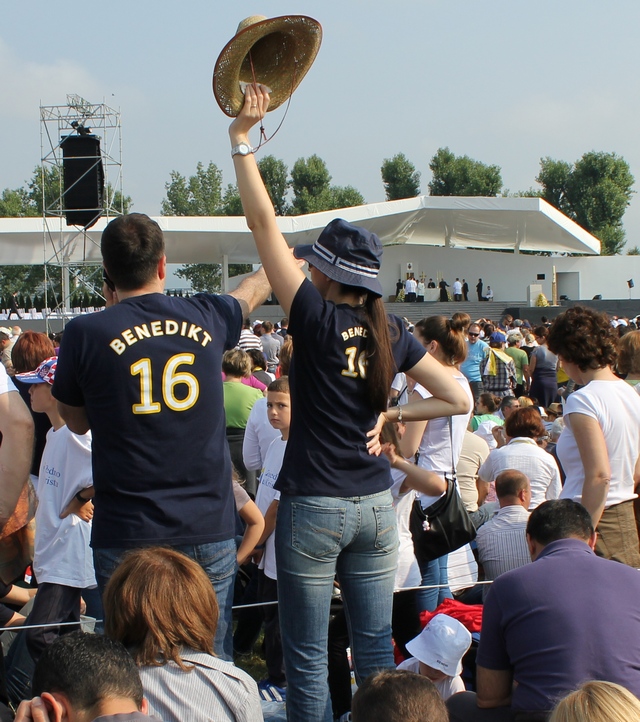
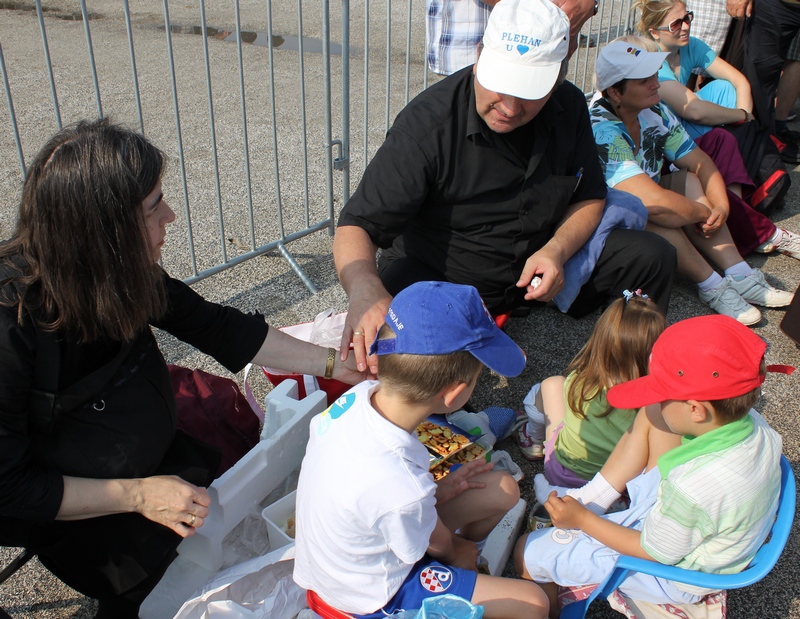
A family from Plehan in Bosnia and Herzegovina. Everybody is secured, including the youngest member of the family.
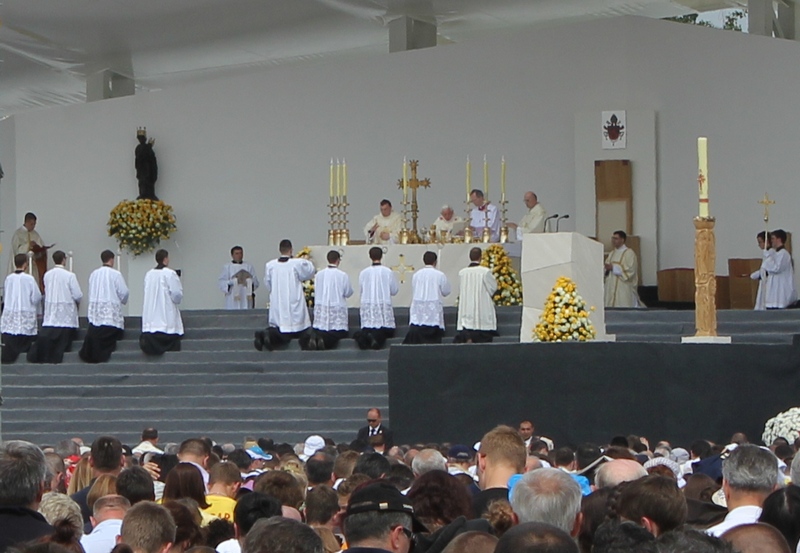
The Holy Mass in Zagreb led by Pontifex Maximus, pope Benedict XVI.
On the left is the famous statue of Mother Mary brought from the town of Marija Bistrica. The statue is five centuries old.
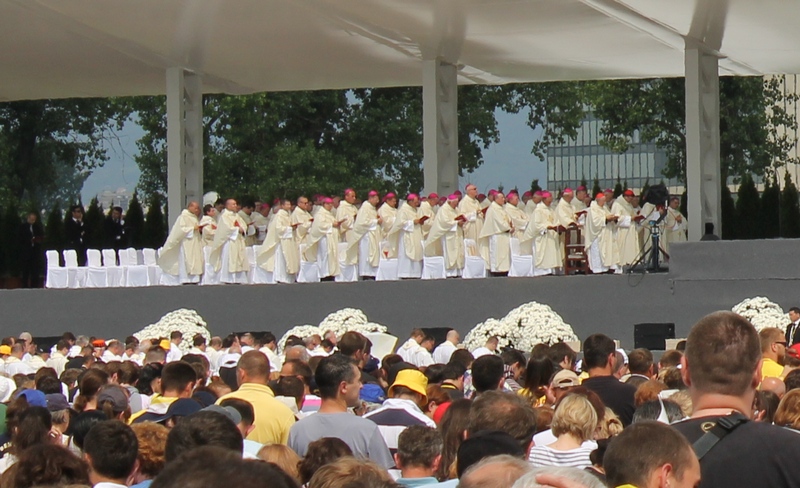
Croatian bishops and archbishops.
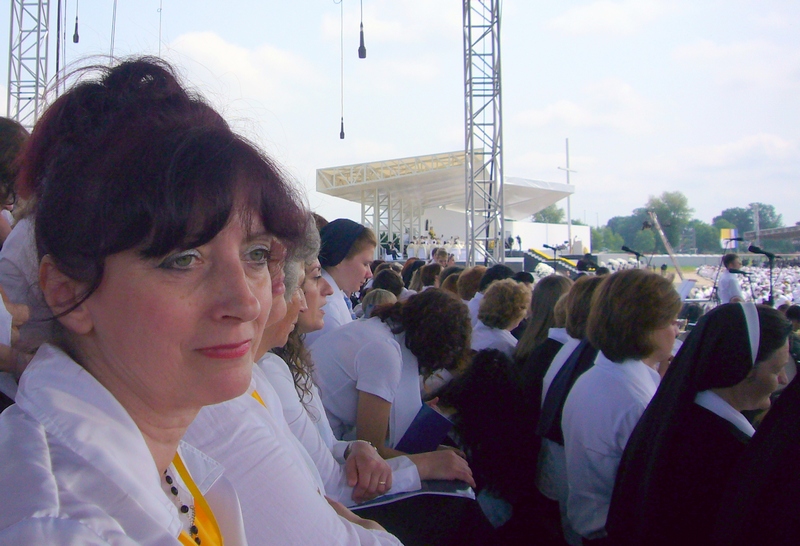
A view to the sanctuary from the United Choir.
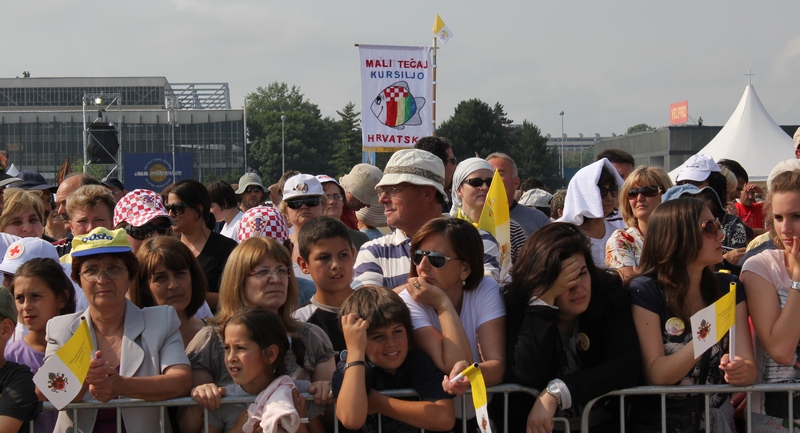
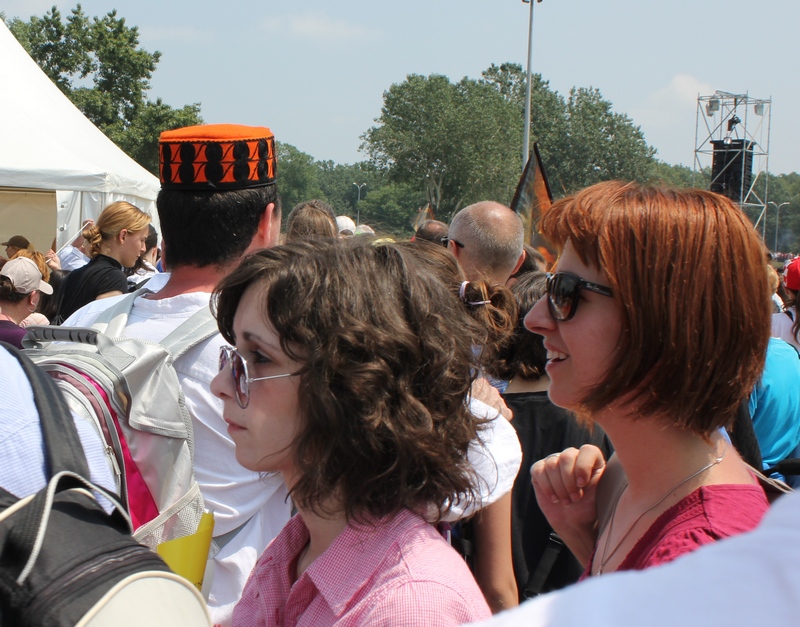
A pilgrim from the city of Šibenik waearing a typical hat from that part of Croatia.
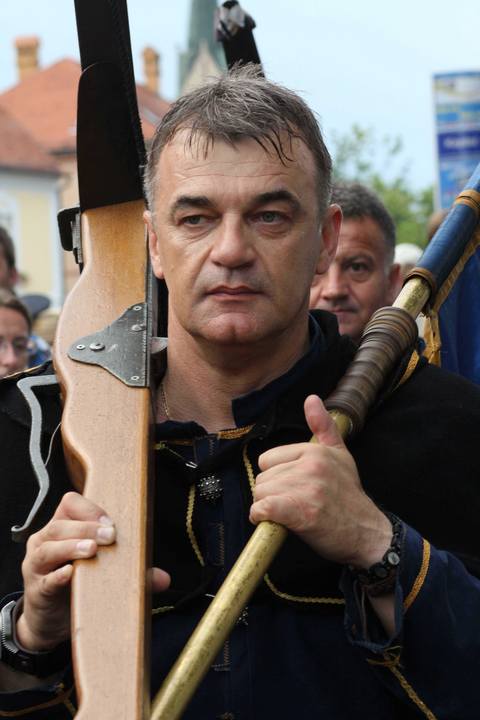
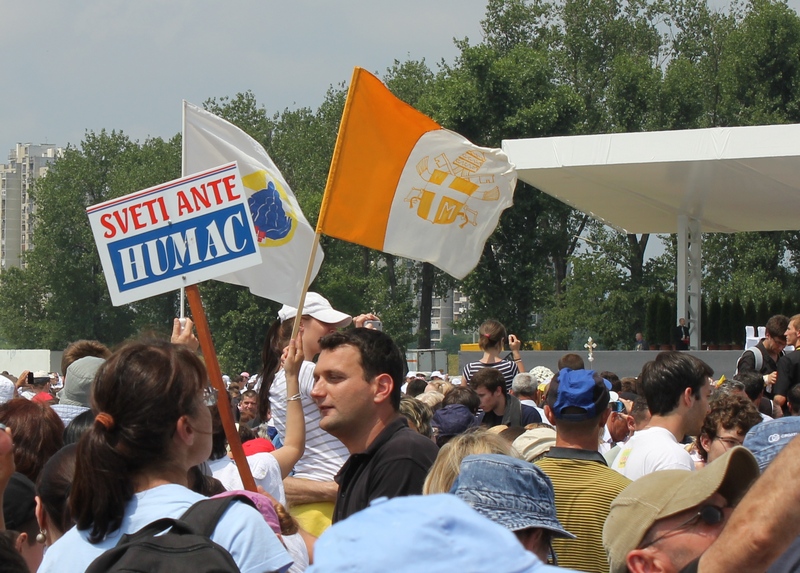
Pilgrims from Humac in Bosnia and Herzegovovina

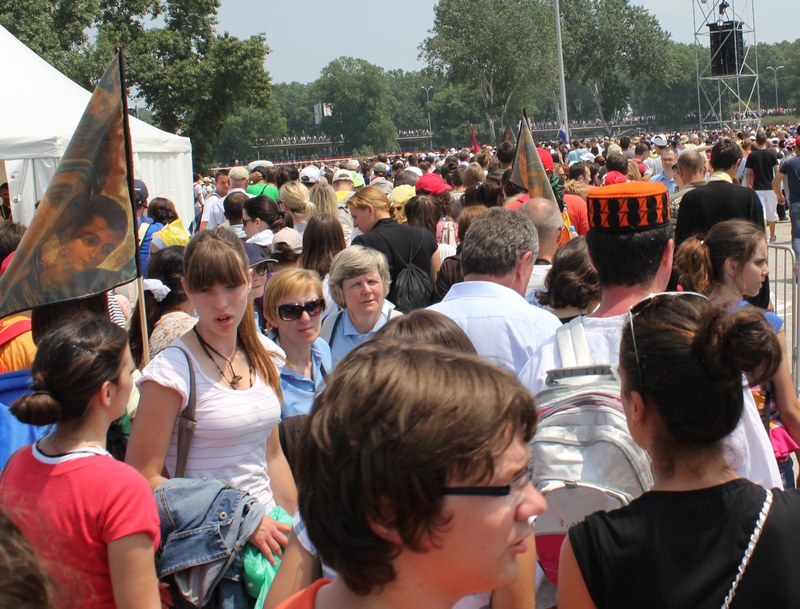
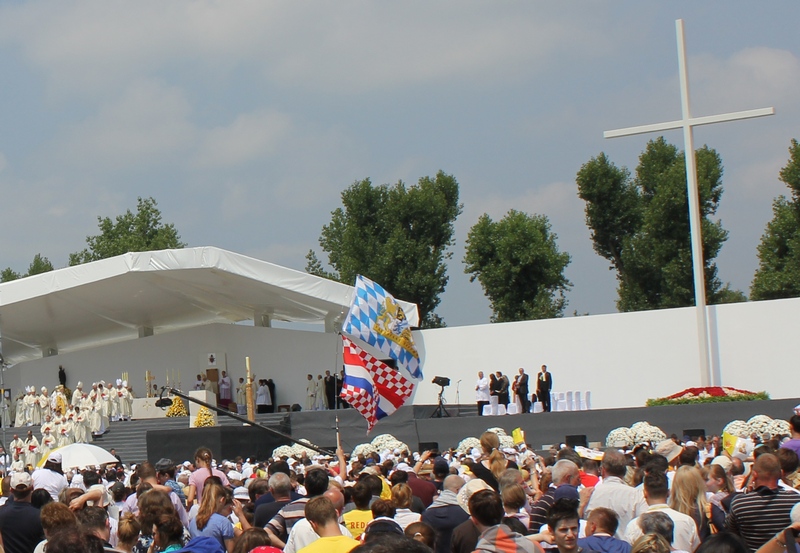
The end of the Holy Mass.
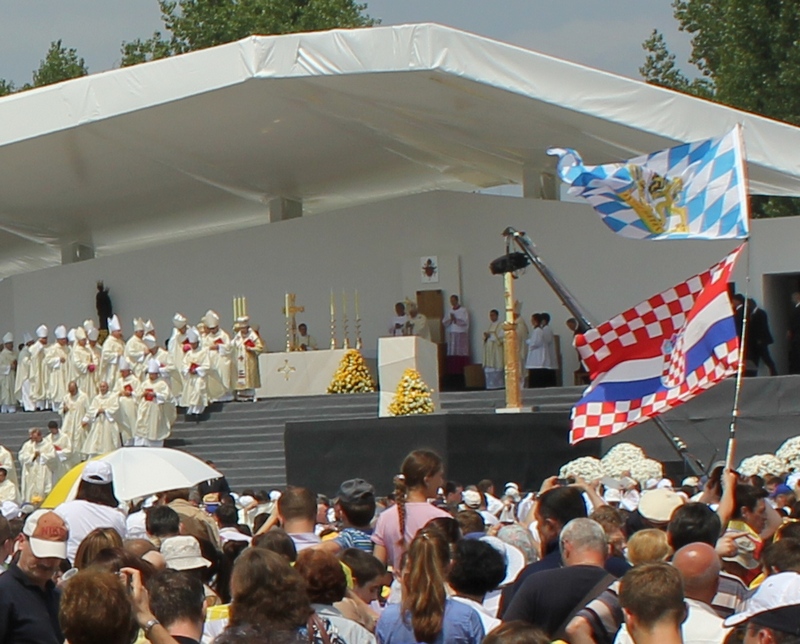
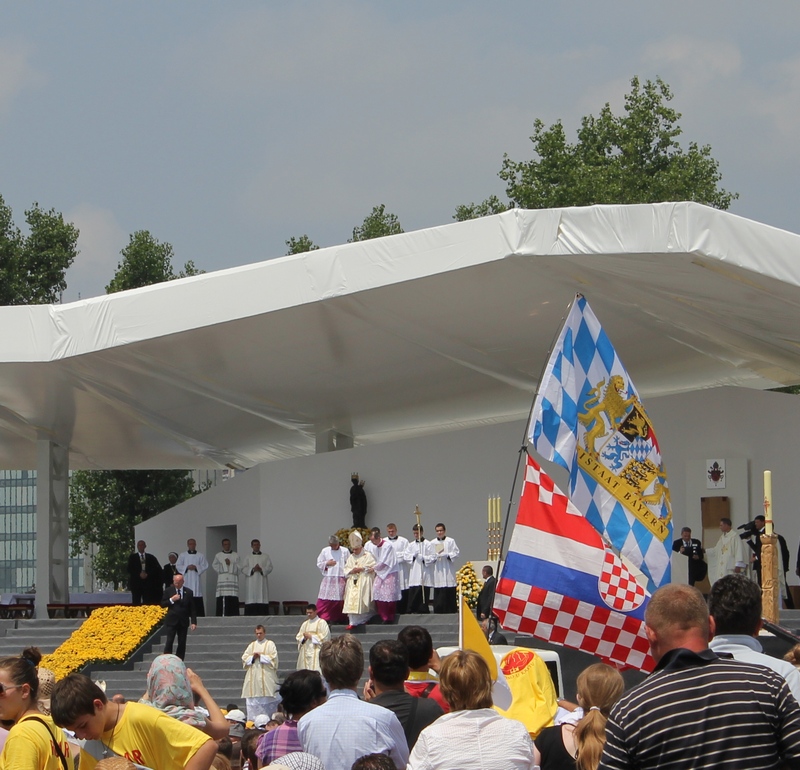
Pope Benedict XVI leaving the sanctuary at the Zagreb Hippodrome.
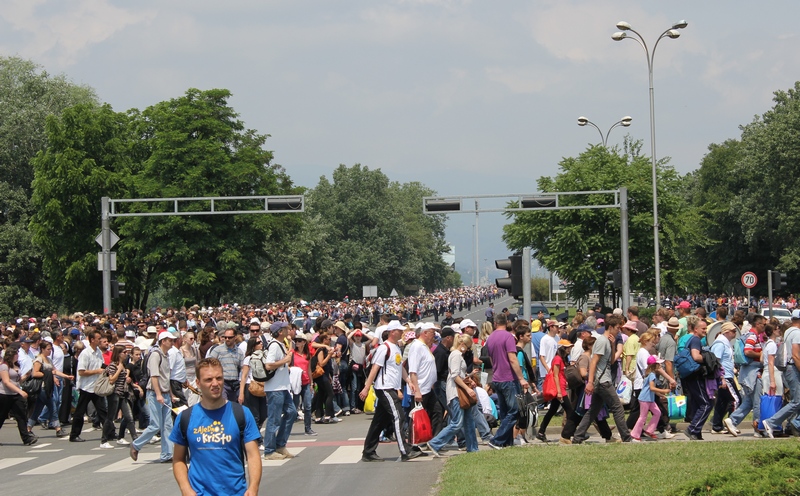
Leaving the Zagreb Hippdorome.
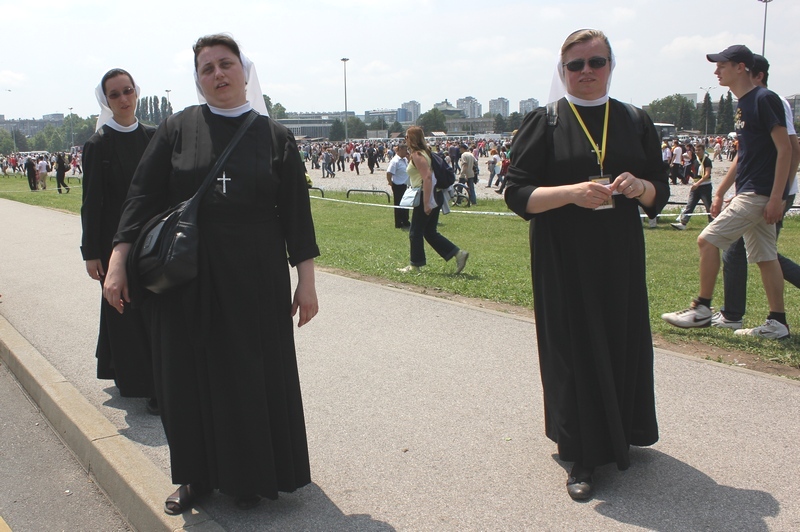
Nuns of the order of Sisters of Mercy from the Spiritual Center Mary's Court in Lužnica near Zagreb.
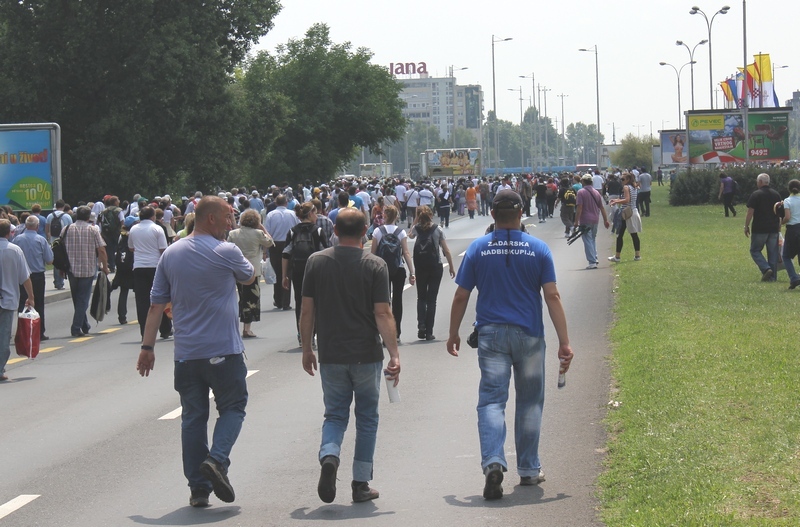
Please, go to the next page below.
The conscience of the person is the key to cultural development in view of the common good; the Church wants to form consciences and so contribute to the construction and growth of society. This was just one of the issues Pope Benedict XVI addressed at the National Theatre in Zagreb, Croatia, where he spoke on Saturday afternoon, addressing representatives of culture and academia, civil society and leaders of other religions and Christian denominations. Taking for example the work of the Croatian Jesuit Ruder Josip Boskovic, who lived in the eighteenth century, founder of the Catholic University, Benedict XVI stressed the importance of acting for the common good. If conscience, according to the prevai ...Â
Â
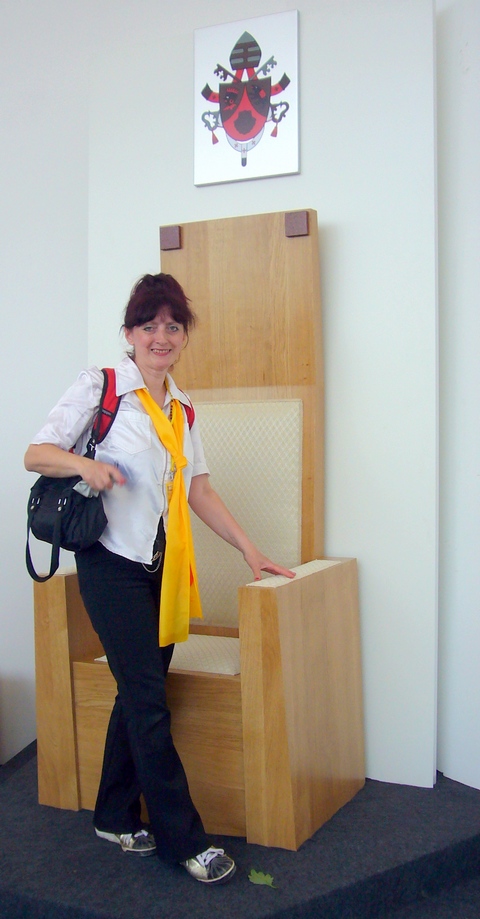
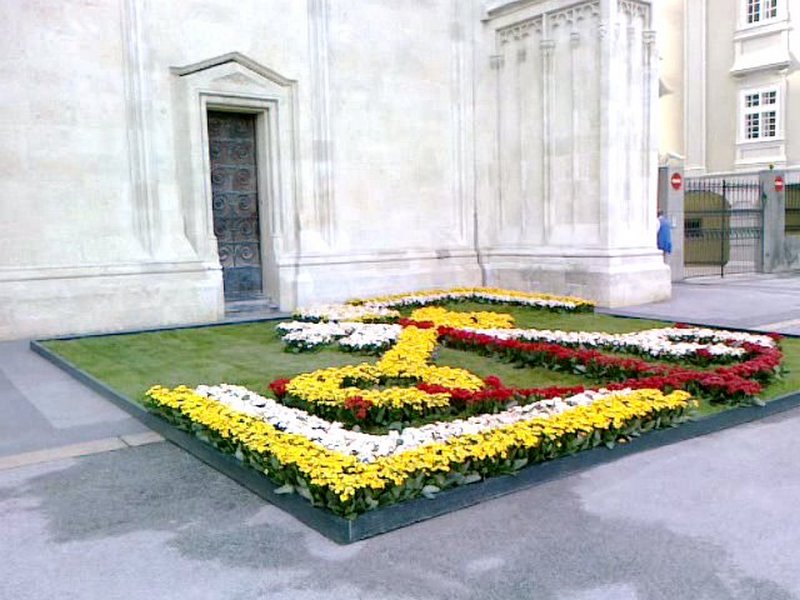
Flower decoration in front of the Zagreb Cathedral. Photo by Snježana Božić (on the above photo.)
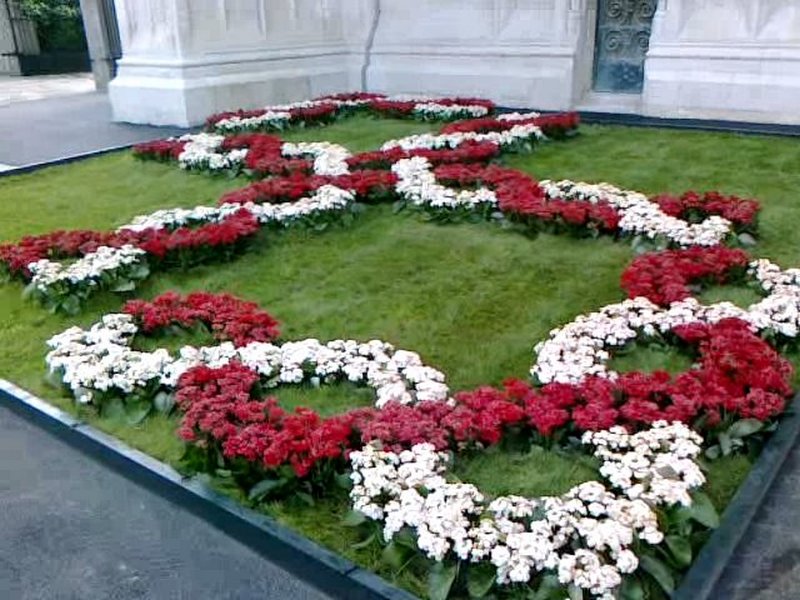
Photo by Snježana Božić.
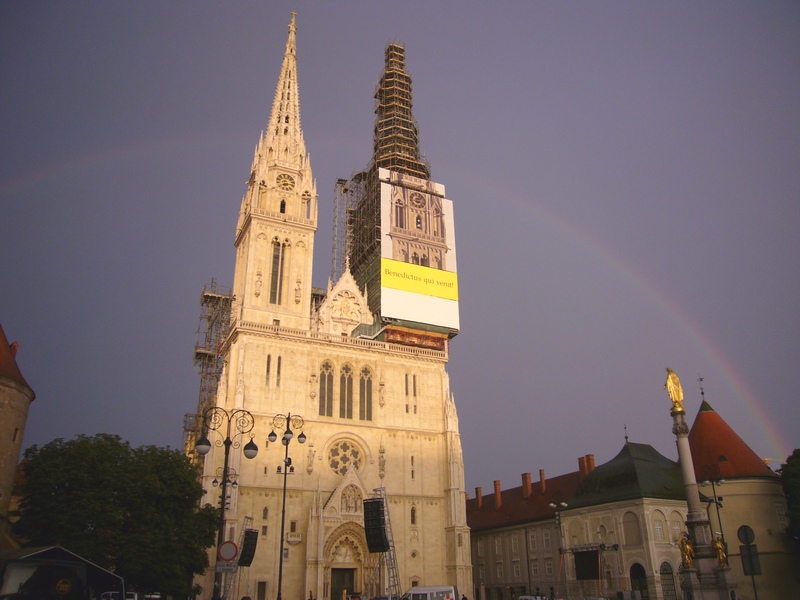
Photo by Snježana Božić.
Formated for CROWN by prof.dr. Darko Žubrinić
Distributed by www.Croatia.org . This message is intended for Croatian Associations/Institutions and their Friends in Croatia and in the World. The opinions/articles expressed on this list do not reflect personal opinions of the moderator. If the reader of this message is not the intended recipient, please delete or destroy all copies of this communication and please, let us know!